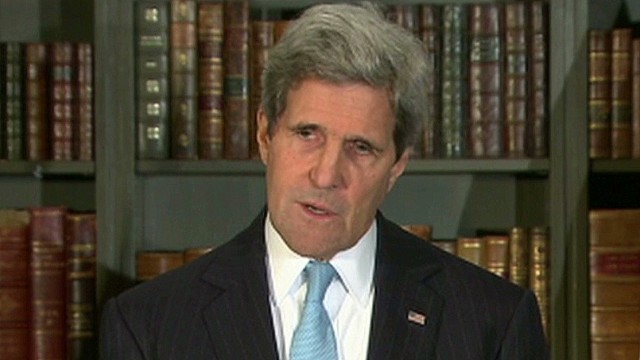
There has been lots of talk by
officials about Ukraine, specifically about the disputed region of Crimea and it
possibly joining Russia.
There have been threats of
sanctions and other punitive measures against Moscow, for allegedly supporting
this breakaway from Ukraine, in spirit and in action. Troops -- some uniformed,
some not -- have been seen in and around the region, raising worries,
even if no one has been shot.
But could something big and
decisive be coming soon?
For as tense as things are now,
the fear is that things could deteriorate quickly and bloodily. The trigger may
be Sunday's vote in Crimea, where voters can formally set the stage for its
secession from Ukraine and becoming part of Russia.
Russia's increased flexing of its
military might has heightened the tensions and raised fears of an imminent
invasion, especially after the referendum results come in and the dominoes start
falling.
Thousands of Russian
paratroopers, artillerymen and more on Friday continued a large-scale military
drill near the Ukraine border. On the same day, armored truck after truck toting
long-range guns and other military equipment rumbled through northern
Crimea.
Already, eight
Ukrainian military units in Crimea have been taken over, 22 others are blocked,
and 49 of 56 border patrol stations are in similar straits, Ukraine's foreign
ministry said.
Kiev's new Western-leaning
government -- which came to power following the ouster of President Viktor
Yanukovych, who fled last month after succumbing to intense public pressure in
part for aligning more with Moscow and less with the European Union -- has
insisted that Ukraine's territorial integrity, including Crimea, must be
respected.
Moscow has been equally steadfast
in its support for ethnic Russians and abiding by voter's' wishes in Crimea.
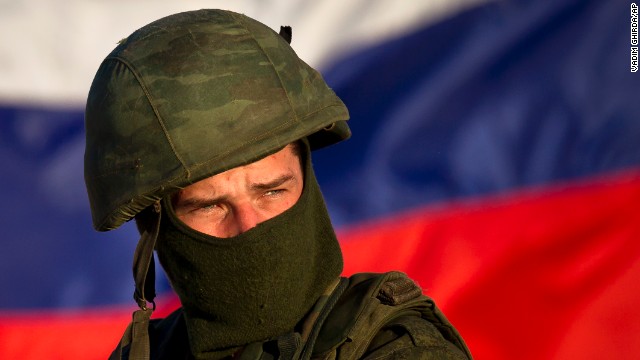 A pro-Russian soldier is backdropped by Russia's flag
while manning a machine gun outside an Ukrainian military base in Perevalne,
Ukraine, on March 15. Rising tensions in Ukraine have centered on Crimea, a
peninsula in the country's southeast where local officials have declared their
allegiance to Russia and armed men have blockaded Ukrainian military sites. But
tensions have also spilled over into other parts of the country.
A pro-Russian soldier is backdropped by Russia's flag
while manning a machine gun outside an Ukrainian military base in Perevalne,
Ukraine, on March 15. Rising tensions in Ukraine have centered on Crimea, a
peninsula in the country's southeast where local officials have declared their
allegiance to Russia and armed men have blockaded Ukrainian military sites. But
tensions have also spilled over into other parts of the country.
Members of a pro-Russian self-defense unit watch and
applaud as a groom and a bride share a kiss at the central square of Sevastopol,
Crimea, on Saturday, March 15.
A pro-Russian soldier guards the perimeter outside an
Ukrainian military base in Perevalne on March 15. Perevalne is on the Crimean
Peninsula.
Two puppies wearing the colors of Ukraine's national flag
smell each other during a dog reunion at the Independence Square in Kiev,
Ukraine, on March 15.
Russian flags wave in front of a monument dedicated to
Soviet Union founder Vladimir Lenin during a pro-Russian rally in Lenin Square
in Simferopol on March 15.
Evgenyi Batyukhov cries on March 14, at the site where
pro-Russian and pro-Ukrainian activists clashed the night before in Donetsk,
Ukraine.
A line of policemen stand in front of a bus of
pro-Ukrainian activists as pro-Russian supporters confront them during a rally
in Donetsk on Thursday, March 13.
Pro-Russian supporters clash with pro-Ukrainian activists
in Donetsk on March 13.
Recent Academy Award winner Jared Leto walks through
Independence Square in Kiev, Ukraine, on March 13. During his Oscars acceptance
speech in early March, the actor spoke to protesters in Ukraine and Venezuela
saying, "We're thinking of you tonight."
A member of a pro-Russian self-defense unit checks a
polling station near Simferopol, Ukraine, on March 13.
A Ukrainian soldier looks out of the window of a regional
military building with a poster reading "Ukraine's armed forces wait for you!"
in Donetsk on March 13.
An armed Cossack stands guard at a checkpoint on the road
from Simferopol to Sevastopol on March 13. Security measures are tightening
around Simferopol, Crimea's capital, as the pro-Russian regional government
prepares to hold a referendum to break away from Ukraine. The standoff has
revived concerns of a return to Cold War relations.
A pro-Russian soldier speaks to a truck driver outside
the Ukrainian infantry base in Perevalne, a village in Crimea, on Wednesday,
March 12.
Cossacks stand guard at Crimea's regional parliament
building in Simferopol on March 12.
Soldiers are seen aboard the Ukrainian ship Slavutych in
the harbor of Sevastopol on Tuesday, March 11.
Ukrainian naval officers board a boat in front of the
Russian minesweeper Turbinist in Sevastopol's harbor on March 11.
People shout slogans during a pro-Russia rally in Donetsk
on Sunday, March 9.
Ukrainian police detain a demonstrator during a
pro-Russian rally in Donetsk on March 9.
Pro-Russia protesters remove a Ukrainian flag from a
flagpole taken from a government building in Donetsk on March 9.
Cossacks and other pro-Russian forces stand guard outside
a government building in Simferopol on Saturday, March 8.
Ukrainian soldiers load armored personnel carriers into
boxcars in the western Ukrainian city of Lviv on March 8.
Armed men believed to be Russian military march in a
village outside Simferopol on Friday, March 7.
Pro-Russia protesters demonstrate outside the Belbek air
base, near Sevastopol, on Thursday, March 6.
A Ukrainian navy officer looks at the scuttled,
decommissioned Russian vessel Ochakov from the Black Sea shore outside the town
of Myrnyi, Ukraine, on March 6. Russian naval personnel scuttled the ship,
blockading access for five Ukrainian naval vessels.
A member of the Russian military patrols around Perevalne
on March 6.
Servicemen guard a checkpoint at a Ukrainian navy base in
Perevalne on March 6.
Ukrainian troops guard the Belbek air base on March
6.
A woman walks past barricades March 6 that were set up by
anti-government protesters in Kiev's Independence Square.
A sailor guards the Ukrainian Navy ship Slavutych in the
Bay of Sevastopol on Wednesday, March 5.
People wait in line for food distribution in Independence
Square on March 5.
Ukrainian sailors carry meat to their vessel in the
Sevastopol harbor on March 5.
Riot police stand at the entrance of a regional
administrative building during a rally in Donetsk on March 5.
A Ukrainian police officer gives instructions to members
of the media in front of the business class lounge of the Simferopol airport on
March 5.
Pro-Russia demonstrators wave a Russian flag after
storming a regional administrative building in Donetsk on March 5.
Demonstrators break a police barrier as they storm a
regional administrative building in Donetsk on March 5.
Ukrainian military recruits line up to receive
instructions in Kiev's Independence Square on Tuesday, March 4.
People stand on the Ukrainian Navy ship Slavutych while
it's at harbor in Sevastopol on March 4. Mattresses were placed over the side of
the ship to hinder any attempted assault.
Ukrainian troops watch as a Russian navy ship blocks the
entrance of the Ukrainian navy base in Sevastopol on March 4.
A woman photographs pro-Russian soldiers guarding
Ukraine's infantry base in Perevalne on March 4.
U.S. Secretary of State John Kerry, wearing a blue scarf,
visits a shrine March 4 for the people who were killed in February during
anti-government protests in Kiev.
Yuli Mamchun, the commander of the Ukrainian military
garrison at the Belbek air base near Sevastopol, salutes on March 4.
Russian soldiers stand guard at the Belbek air base on
March 4.
Ukrainian military members march at the Belbek air base
on March 4.
Russian soldiers fire warning shots to keep back
Ukrainian military members at the Belbek air base on March 4.
A Ukrainian airman puts the Ukrainian national flag over
the gate of the Belbek air base as they guard what's left under their control on
March 4.
Russian soldiers aim a grenade launcher and machine gun
as they guard positions at the Belbek air base on March 4.
Ukrainian seamen stand guard on the Ukrainian navy ship
Slavutych in the Sevastopol harbor on Monday, March 3.
Oleg, a Ukrainian soldier, kisses his girlfriend,
Svetlana, through the gates of the Belbek base entrance on March 3. Tensions are
high at the base, where Ukrainian soldiers were standing guard inside the
building while alleged Russian gunmen were standing guard outside the
gates.
Wives of Ukrainian soldiers walk past Russian soldiers to
visit their husbands guarding a military base in Perevalne on March 3.
A Russian soldier guards an area outside Ukraine's
military base in the village of Perevalne on March 3.
A sailor looks out a window near the entrance to the
Ukrainian navy headquarters in Sevastopol on March 3.
Armed men in military uniform walk outside a Ukrainian
military unit near Simferopol on Sunday, March 2. Hundreds of armed men in
trucks and armored vehicles surrounded the Ukrainian base Sunday in Crimea,
blocking its soldiers from leaving.
Soldiers walk outside a Ukrainian military base in
Perevalne as a local resident waves a Russian flag March 2.
Demonstrators shout during a rally in Kiev's Independence
Square on March 2.
Ukrainian soldiers, left, and unidentified gunmen, right,
stand at the gate of an infantry base in Perevalne on March 2.
Ukrainian soldiers guard a gate of an infantry base in
Perevalne on March 2.
A woman cries during a rally in Independence Square on
March 2.
Protesters hold flags of the United States, Germany and
Italy during a rally in Independence Square on March 2.
People attend a morning prayer service at Independence
Square on March 2.
A soldier and a truck driver unload bread outside the
Ukranian navy headquarters in Sevastopol on March 2.
Heavily armed troops, displaying no identifying insignia
and who were mingling with local pro-Russian militants, stand guard outside a
local government building in Simferopol on March 2.
A woman waits in front of unidentified men in military
fatigues who were blocking a base of the Ukrainian frontier guard unit in
Balaklava, Ukraine, on Saturday, March 1.
U.S. President Barack Obama, in the Oval Office of the
White House, talks on the phone March 1 with Russian President Vladimir
Putin.
Troops stand guard in Balaklava on March 1.
Heavily armed soldiers displaying no identifying insignia
maintain watch in Simferopol on March 1.
People gather around the coffin of a man who was killed
during clashes with riot police in Independence Square.
Pro-Russian activists hold Russian flags during a rally
in the center of Donetsk on March 1.
Pro-Russian activists clash with Maidan supporters as
they storm the regional government building in Kharkiv, Ukraine, on March
1.
A protester stands at a memorial March 1 for the people
killed in clashes at Independence Square.
Armed men patrol outside the Simferopol International
Airport on Friday, February 28.
An image provided to CNN by a local resident shows
Russian tanks on the move in Sevastopol.
Russian troops block a road February 28 toward the
military airport in Sevastopol. The Russian Black Sea Fleet is based at the port
city.
Armed men stand guard in front of a building near the
Simferopol airport on February 28.
An armed man wearing no identifying insignia patrols
outside Simferopol International Airport on February 28.
Police stand guard outside the Crimea regional parliament
building Thursday, February 27, in Simferopol. Armed men seized the regional
government administration building and parliament in Crimea.
Police intervene as Russian supporters gather in front of
the parliament building in Simferopol on February 27.
A man adds fuel to a fire at a barricade in Independence
Square on February 27. Dozens of people were killed during clashes between
security forces and protesters.
Pro-Russia demonstrators wave Russian and Crimean flags
in front of a local government building in Simferopol on February 27.
Barricades in front of a government building in
Simferopol on February 27 hold a banner that reads: "Crimea Russia." There's a
broad divide between those who support the pro-Western developments in Kiev and
those who back Russia's continued influence in Crimea and across Ukraine.
Protesters stand in front of a government building in
Simferopol on February 27. Tensions have simmered in the Crimea region since the
ouster of Ukrainian President Viktor Yanukovych.
Protesters in support of the president's ouster rally in
Independence Square, which has been the center of opposition, on Wednesday,
February 26.
Security forces stand guard during clashes between
opposing sides in front of Crimea's parliament building in Simferopol on
February 26.
Pro-Russian demonstrators, right, clash with anti-Russian
protesters in front of a government building in Simferopol on February 26.
A police officer gets pulled into a crowd of Crimean
Tatars in Simferopol on February 26. The Tatars, an ethnic minority group
deported during the Stalin era, rallied in support of Ukraine's interim
government.
A man places flowers at a barricade near Independence
Square on February 26.
On February 26 in Kiev, a woman holds a photograph of a
protester killed during the height of tensions.
Police guard a government building in Donetsk on February
26.
Protesters remove a fence that surrounds Ukraine's
parliament in Kiev on February 26.
People sing the Ukrainian national anthem at Independence
Square on Monday, February 24.
Gas masks used by protesters sit next to a barricade in
Independence Square on February 24.
A woman cries February 24 near a memorial for the people
killed in Kiev.
People wave a large Ukrainian flag in Independence Square
on Sunday, February 23.
Two pro-government supporters are made to pray February
23 in front of a shrine to dead anti-government protesters.
A man and his daughter lay flowers at a memorial for
protesters killed in Independence Square.
Former Prime Minister Yulia Tymoshenko speaks at
Independence Square on Saturday, February 22, hours after being released from
prison. Tymoshenko, considered a hero of a 2004 revolution against Yanukovych,
was released after 2½ years behind bars.
Tymoshenko is greeted by supporters shortly after being
freed from prison in Kharkiv on February 22.
A protester guards the entrance to Yanukovych's abandoned
residence outside Kiev on February 22.
Anti-government protesters guard the streets next to the
presidential offices in Kiev on February 22.
Anti-government protesters drive a military vehicle in
Independence Square on February 22. Many protesters said they wouldn't leave the
square until Yanukovych resigned.
Ukrainian lawmakers argue during a session of Parliament
on Friday, February 21.
Men in Kiev carry a casket containing the body of a
protester killed in clashes with police.
Protesters cheer after news of an agreement between the
opposing sides in Kiev on February 21.
Crisis in Ukraine
HIDE CAPTION
 Photos: Crisis in
Ukraine
Photos: Crisis in
Ukraine
Prepping for Crimea's
independence vote
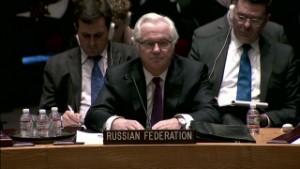
Protesters face off in city of
Donetsk

Protesters face off in city of
Donetsk
Estonia's defense minister,
Urmas Reinsalu, warned Friday that Ukraine is on the verge of a full-scale
military conflict unless Russian President Vladimir Putin's hand is forced.
"It is clear that we are at a
crossroads," U.N. Secretary-General Ban Ki-moon said Friday. "If positions
continue to harden and rhetoric continues to sharpen, there is great risk of a
dangerous downward spiral."
Neither side is budging.
Russia so far has refused any
direct talks with Ukraine's new leaders, but its foreign minister, Sergey
Lavrov, has talked daily with Kerry, met face-to-face with him last week in
Europe and the diplomats met again for more than five hours Friday in
London.
Afterward, it appeared -- as has
been the case for weeks -- the only thing Russia and the United States agree
upon is that they can't agree on anything of substance.
As Lavrov said Friday, "We don't
have a common vision."
Kerry: Actions
'calibrated' if Russia open to talks
While the Russian foreign
minister and his team did engage in talks Friday, calling them negotiations may
be a reach. As Kerry said, Moscow wasn't going to do anything until the Crimea
referendum's results are released, likely Monday.
In fact, Lavrov didn't have any
authority to even negotiate on anything to do with Crimea, according to a senior
State Department official.
His boss, Putin, reiterated
Friday that Sunday's vote is in line with international law and the U.N.
charter, a Kremlin statement said. A day earlier, Russian U.N. Ambassador Vitaly
Churkin asked why Crimeans don't deserve a right to self-determination, just
like anyone else.
Ukraine's new government, as
well as Western leaders, see it differently.
While Churkin accused the West
of having "fanned the flames of unrest," officials there accuse Russia of
instigating and furthering the crisis -- including sending troops into Crimea to
blockade and seize Ukrainian military and other facilities, something Moscow has
denied.
European nations and the United
States have already hit back some, with targeted punishments in addition to
offers of billions in aid to Ukraine's fledgling government. The situation seems
to have had an impact already within Russia, as evidenced by steep declines in
its stock market and the value of the ruble. And the State Department cautioned
Americans about traveling to Russia given "the possibility of violence or
anti-U.S. actions directed against U.S. citizens or U.S. interests."
Kerry warned Friday that the
"consequences" will be far more stringent should Putin sign off on the
"back-door annexation" of Crimea.
At the same time, he opened the
door for less strident measures should Russia opt not to take in Crimea --
whatever the referendum says -- and instead go along with more autonomy, human
rights monitoring and other steps for that region if it stays part of
Ukraine.
"If there is greater diplomatic
opportunity that can be pursued -- and that is, in fact, on the table -- then
I'm confident that whatever the response is would be calibrated accordingly,"
Kerry said. "But if ... a decision is made that is negative and/or flies in the
face of all of the rationale that the EU and others have put on the table for
the illegality (of an annexation), that will obviously demand some further
response."
For his part, Lavrov called
Friday's conversations -- which he characterized as "negotiations" -- as
"useful," even if they didn't produce a breakthrough. He added he's aware of
what might happen if Crimea becomes part of Russia, saying sanctions won't help
anyone.
"I assure you that our partners
understand that sanctions are counterproductive ... and (they) will not
facilitate mutual interests," he said.
Unrest, military action
continues
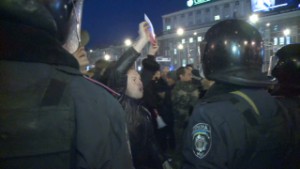 Ambassador: Russia doesn't
want war
Ambassador: Russia doesn't
want war 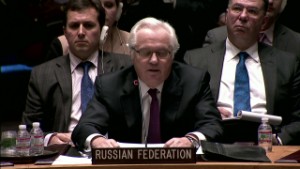
Ukrainian PM: We urge Russia
to pull back
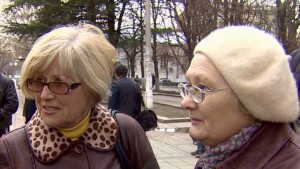
Voices on the Ukraine/Crimea
referendum
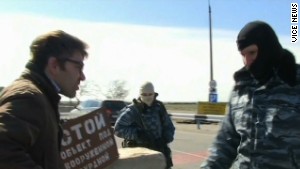
See dramatic Ukraine
confrontation
Some 1,500 miles away from these
seemingly calm, cordial discussions, Crimea continues to boil.
Col. Evgeniy Pivovarov, the head
of a military hospital associated with Ukraine's foreign ministry, was
"kidnapped" Friday evening in the Crimean capital of Simferopol, a Ukrainian
defense ministry spokesman for Crimea said.
"His kidnappers cuffed
Pivovarov's hands behind his back and drove him away," said Vladislav Seleznev.
"His whereabouts are currently unknown."
Meanwhile, in northern Crimea,
video shot by CNN showed green trucks rolling in the direction of Dzhankoy, home
to a key military airfield. They appeared loaded, including some with long-range
artillery guns.
Who was driving them, and for
what purpose? One of the vehicles had a Russian license plate, but the other had
no plates at all. And men connected to the convoy refused to answer CNN's
questions on the matter.
Ukrainian officials have
repeatedly claimed that Russian troops are among the armed men that have,
effectively, taken over Crimea on the heels of the local government's decision
to side with Moscow and against Kiev.
Russia has denied any direct
involvement, saying what's happening in Crimea is an internal matter. The
powerful nation hasn't been shy, however, about military activities on its side
of the border with Ukraine.
Its defense ministry has said
about 8,500 artillery personnel were staging snap military exercises not far
from Ukraine's eastern border. U.S. Ambassador to the U.N. Samantha Power
estimated "at least 10,000" Russian troops overall were involved.
"This is the second time inside
of a month that Russia has chosen to mass large amounts of force on short notice
without much transparency around the eastern borders of Ukraine," a senior State
Department official said.
Meanwhile, six Russian jet
fighters were moved to Bobruisk airfield in Belarus on Thursday, Russian state
news agency RIA Novosti cited the Belarussian Defense Ministry as saying
Friday.
The move is part of Belarus'
offer to Russia to participate in joint military drills, the news agency
reported. Belarus, a former Soviet republic, borders Russia and northern
Ukraine.
Russia's defense ministry
released video Friday showing paratroopers floating downward as part of those
drills.
Should Moscow launch a
full-fledged invasion of at least Crimea, they should prevail, said Ruslan
Pukhov, the director of CAST, or the Centre for Analysis of Strategies and
Technologies, in Moscow.
Russia has more than four times
the amount of troops as Ukraine, not to mention exponentially more tanks,
armored personnel carriers and ships.
"There is no fortification.
There is no military infrastructure," Pukhov said. "That is why I think it would
be quite easy and quick."
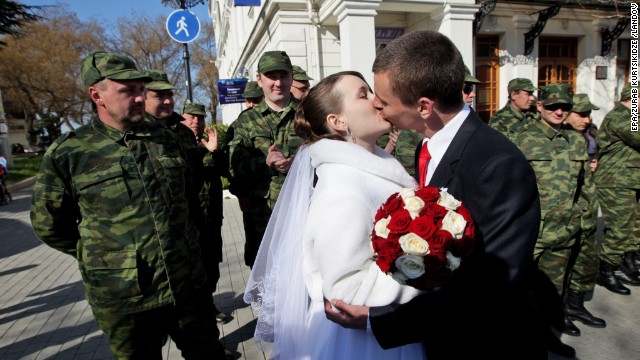 Members of a pro-Russian self-defense unit watch and
applaud as a groom and a bride share a kiss at the central square of Sevastopol,
Crimea, on Saturday, March 15.
Members of a pro-Russian self-defense unit watch and
applaud as a groom and a bride share a kiss at the central square of Sevastopol,
Crimea, on Saturday, March 15.
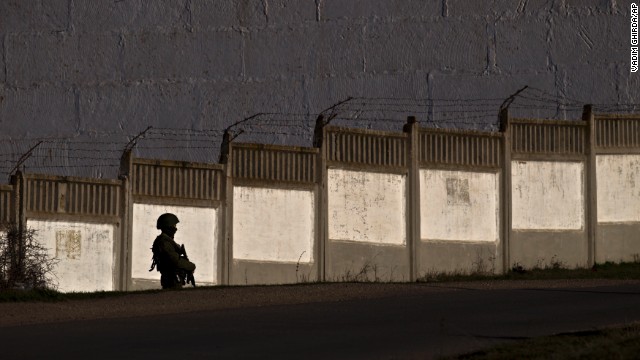 A pro-Russian soldier guards the perimeter outside an
Ukrainian military base in Perevalne on March 15. Perevalne is on the Crimean
Peninsula.
A pro-Russian soldier guards the perimeter outside an
Ukrainian military base in Perevalne on March 15. Perevalne is on the Crimean
Peninsula.
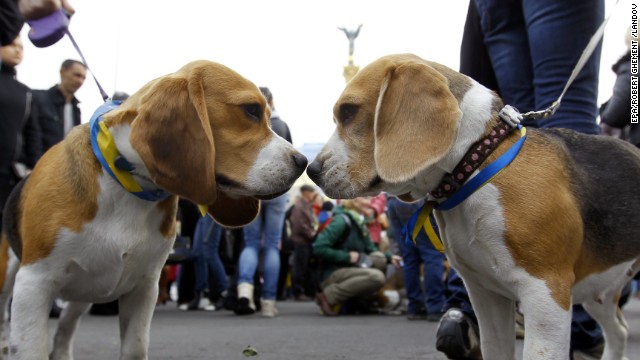 Two puppies wearing the colors of Ukraine's national flag
smell each other during a dog reunion at the Independence Square in Kiev,
Ukraine, on March 15.
Two puppies wearing the colors of Ukraine's national flag
smell each other during a dog reunion at the Independence Square in Kiev,
Ukraine, on March 15.
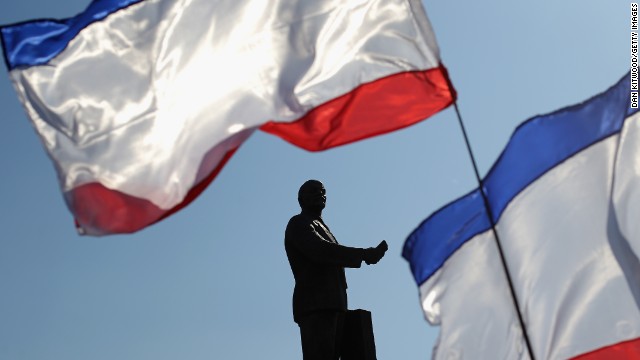 Russian flags wave in front of a monument dedicated to
Soviet Union founder Vladimir Lenin during a pro-Russian rally in Lenin Square
in Simferopol on March 15.
Russian flags wave in front of a monument dedicated to
Soviet Union founder Vladimir Lenin during a pro-Russian rally in Lenin Square
in Simferopol on March 15.
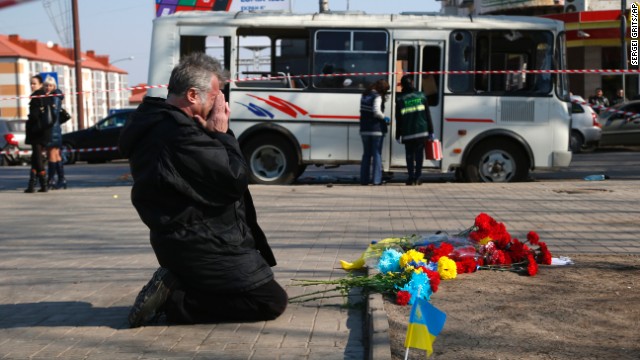 Evgenyi Batyukhov cries on March 14, at the site where
pro-Russian and pro-Ukrainian activists clashed the night before in Donetsk,
Ukraine.
Evgenyi Batyukhov cries on March 14, at the site where
pro-Russian and pro-Ukrainian activists clashed the night before in Donetsk,
Ukraine.
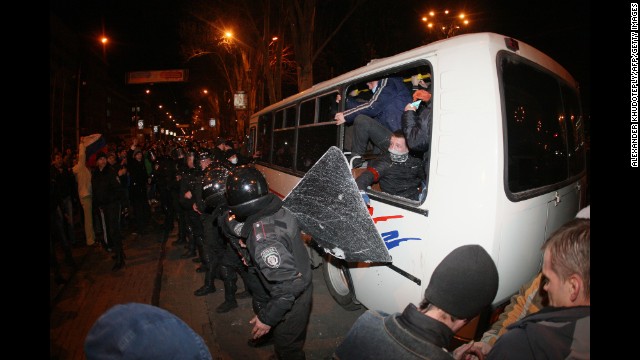 A line of policemen stand in front of a bus of
pro-Ukrainian activists as pro-Russian supporters confront them during a rally
in Donetsk on Thursday, March 13.
A line of policemen stand in front of a bus of
pro-Ukrainian activists as pro-Russian supporters confront them during a rally
in Donetsk on Thursday, March 13.
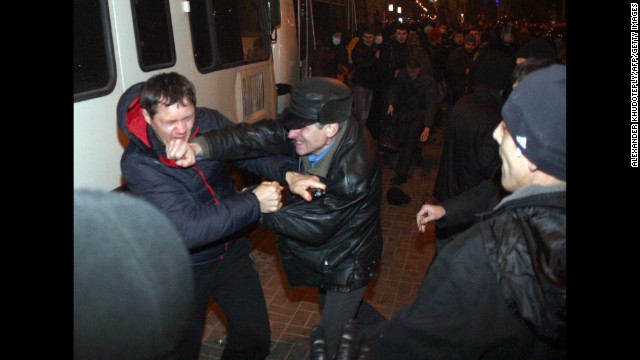 Pro-Russian supporters clash with pro-Ukrainian activists
in Donetsk on March 13.
Pro-Russian supporters clash with pro-Ukrainian activists
in Donetsk on March 13.
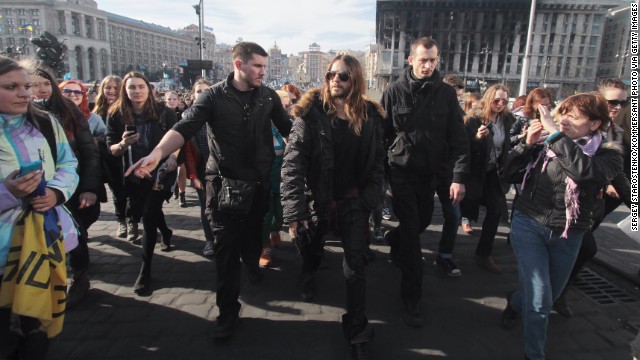 Recent Academy Award winner Jared Leto walks through
Independence Square in Kiev, Ukraine, on March 13. During his Oscars acceptance
speech in early March, the actor spoke to protesters in Ukraine and Venezuela
saying, "We're thinking of you tonight."
Recent Academy Award winner Jared Leto walks through
Independence Square in Kiev, Ukraine, on March 13. During his Oscars acceptance
speech in early March, the actor spoke to protesters in Ukraine and Venezuela
saying, "We're thinking of you tonight."
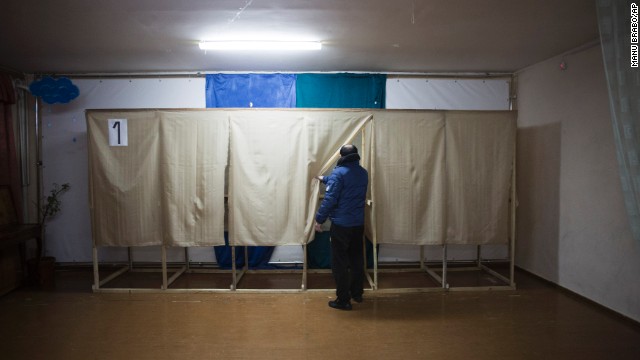 A member of a pro-Russian self-defense unit checks a
polling station near Simferopol, Ukraine, on March 13.
A member of a pro-Russian self-defense unit checks a
polling station near Simferopol, Ukraine, on March 13.
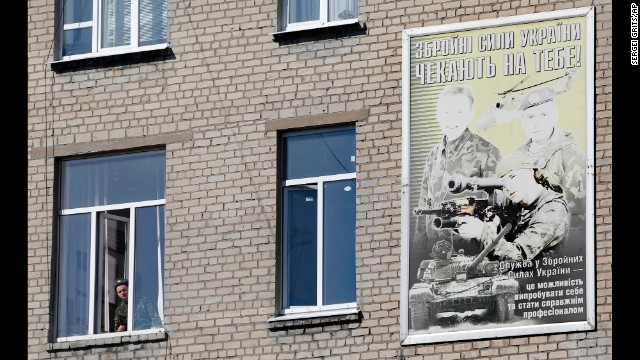 A Ukrainian soldier looks out of the window of a regional
military building with a poster reading "Ukraine's armed forces wait for you!"
in Donetsk on March 13.
A Ukrainian soldier looks out of the window of a regional
military building with a poster reading "Ukraine's armed forces wait for you!"
in Donetsk on March 13.
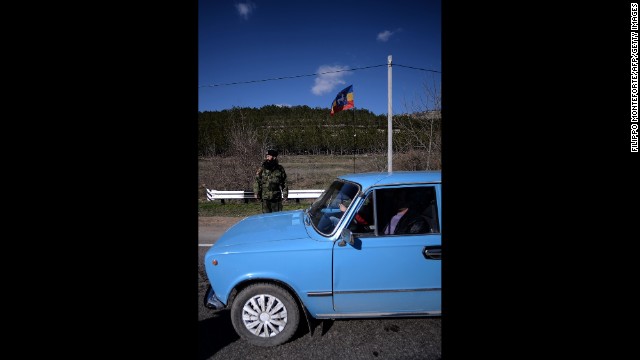 An armed Cossack stands guard at a checkpoint on the road
from Simferopol to Sevastopol on March 13. Security measures are tightening
around Simferopol, Crimea's capital, as the pro-Russian regional government
prepares to hold a referendum to break away from Ukraine. The standoff has
revived concerns of a return to Cold War relations.
An armed Cossack stands guard at a checkpoint on the road
from Simferopol to Sevastopol on March 13. Security measures are tightening
around Simferopol, Crimea's capital, as the pro-Russian regional government
prepares to hold a referendum to break away from Ukraine. The standoff has
revived concerns of a return to Cold War relations.
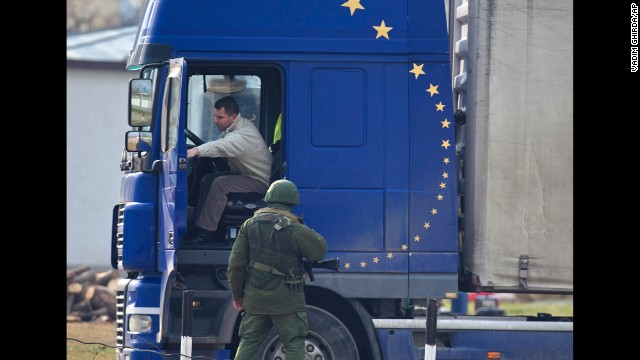 A pro-Russian soldier speaks to a truck driver outside
the Ukrainian infantry base in Perevalne, a village in Crimea, on Wednesday,
March 12.
A pro-Russian soldier speaks to a truck driver outside
the Ukrainian infantry base in Perevalne, a village in Crimea, on Wednesday,
March 12.
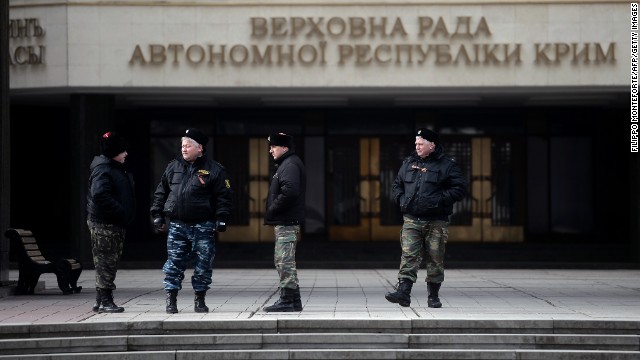 Cossacks stand guard at Crimea's regional parliament
building in Simferopol on March 12.
Cossacks stand guard at Crimea's regional parliament
building in Simferopol on March 12.
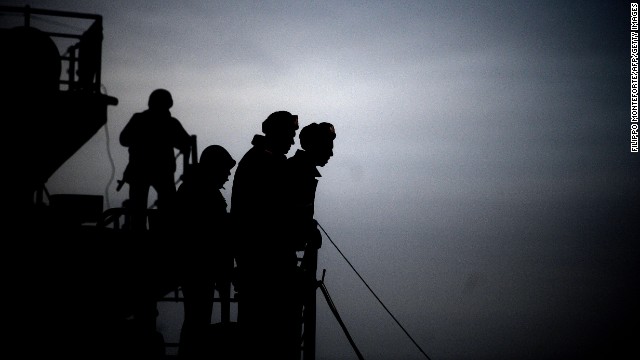 Soldiers are seen aboard the Ukrainian ship Slavutych in
the harbor of Sevastopol on Tuesday, March 11.
Soldiers are seen aboard the Ukrainian ship Slavutych in
the harbor of Sevastopol on Tuesday, March 11.
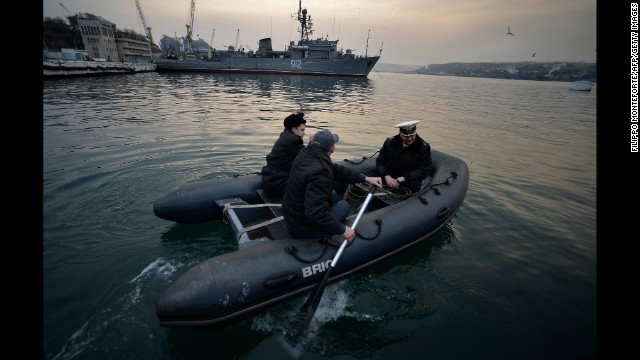 Ukrainian naval officers board a boat in front of the
Russian minesweeper Turbinist in Sevastopol's harbor on March 11.
Ukrainian naval officers board a boat in front of the
Russian minesweeper Turbinist in Sevastopol's harbor on March 11.
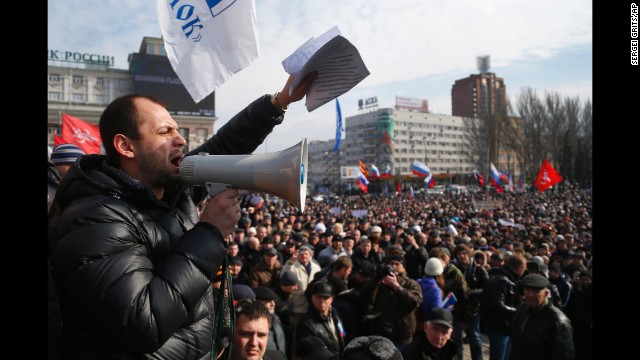 People shout slogans during a pro-Russia rally in Donetsk
on Sunday, March 9.
People shout slogans during a pro-Russia rally in Donetsk
on Sunday, March 9.
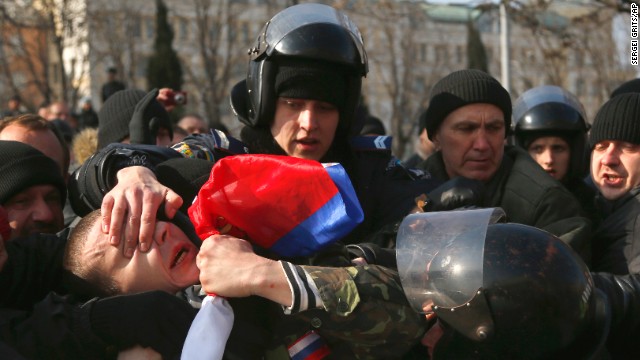 Ukrainian police detain a demonstrator during a
pro-Russian rally in Donetsk on March 9.
Ukrainian police detain a demonstrator during a
pro-Russian rally in Donetsk on March 9.
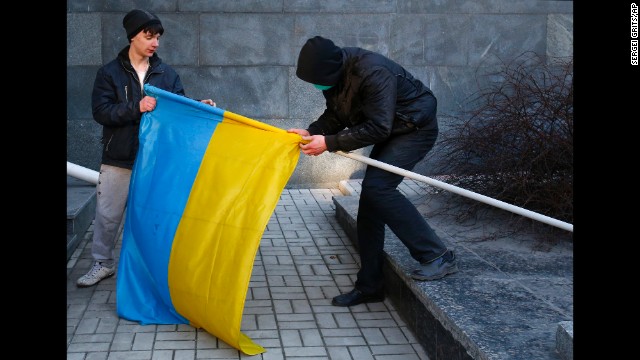 Pro-Russia protesters remove a Ukrainian flag from a
flagpole taken from a government building in Donetsk on March 9.
Pro-Russia protesters remove a Ukrainian flag from a
flagpole taken from a government building in Donetsk on March 9.
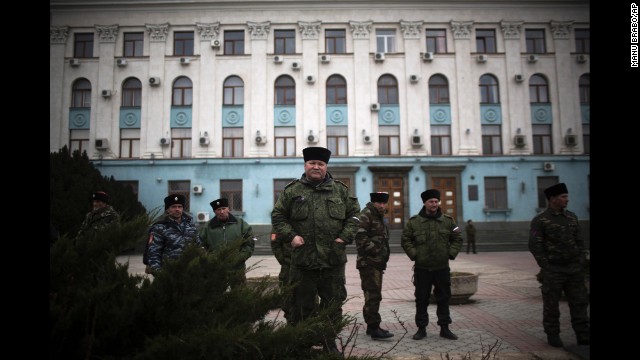 Cossacks and other pro-Russian forces stand guard outside
a government building in Simferopol on Saturday, March 8.
Cossacks and other pro-Russian forces stand guard outside
a government building in Simferopol on Saturday, March 8.
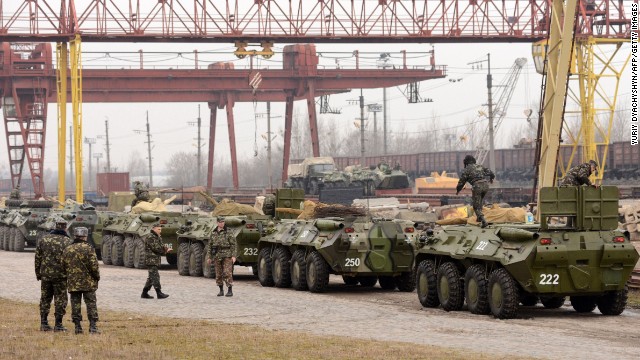 Ukrainian soldiers load armored personnel carriers into
boxcars in the western Ukrainian city of Lviv on March 8.
Ukrainian soldiers load armored personnel carriers into
boxcars in the western Ukrainian city of Lviv on March 8.
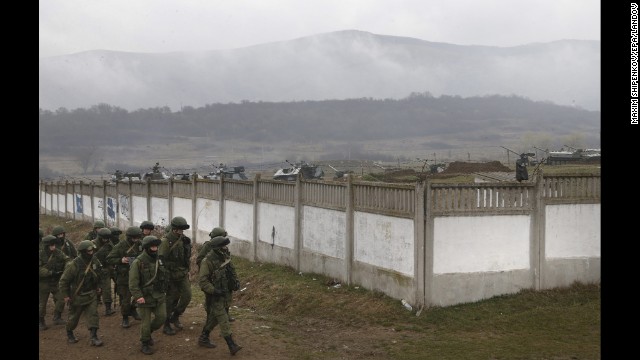 Armed men believed to be Russian military march in a
village outside Simferopol on Friday, March 7.
Armed men believed to be Russian military march in a
village outside Simferopol on Friday, March 7.
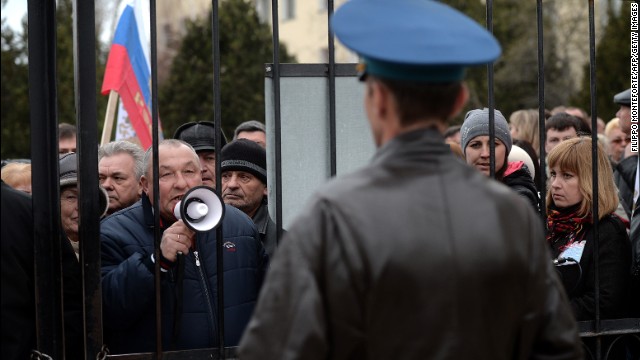 Pro-Russia protesters demonstrate outside the Belbek air
base, near Sevastopol, on Thursday, March 6.
Pro-Russia protesters demonstrate outside the Belbek air
base, near Sevastopol, on Thursday, March 6.
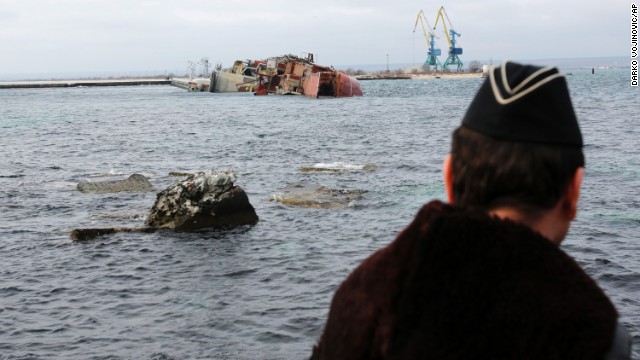 A Ukrainian navy officer looks at the scuttled,
decommissioned Russian vessel Ochakov from the Black Sea shore outside the town
of Myrnyi, Ukraine, on March 6. Russian naval personnel scuttled the ship,
blockading access for five Ukrainian naval vessels.
A Ukrainian navy officer looks at the scuttled,
decommissioned Russian vessel Ochakov from the Black Sea shore outside the town
of Myrnyi, Ukraine, on March 6. Russian naval personnel scuttled the ship,
blockading access for five Ukrainian naval vessels.
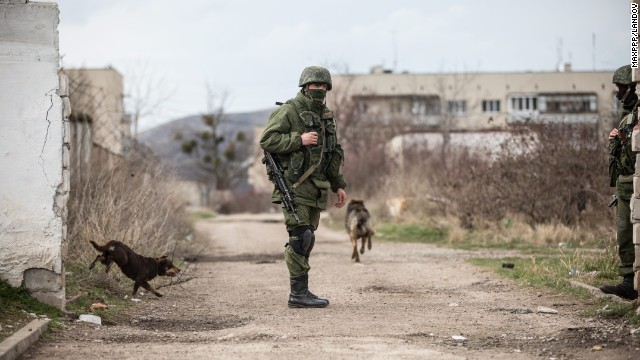 A member of the Russian military patrols around Perevalne
on March 6.
A member of the Russian military patrols around Perevalne
on March 6.
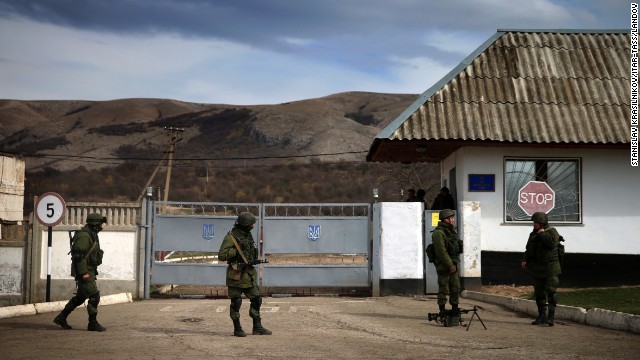 Servicemen guard a checkpoint at a Ukrainian navy base in
Perevalne on March 6.
Servicemen guard a checkpoint at a Ukrainian navy base in
Perevalne on March 6.
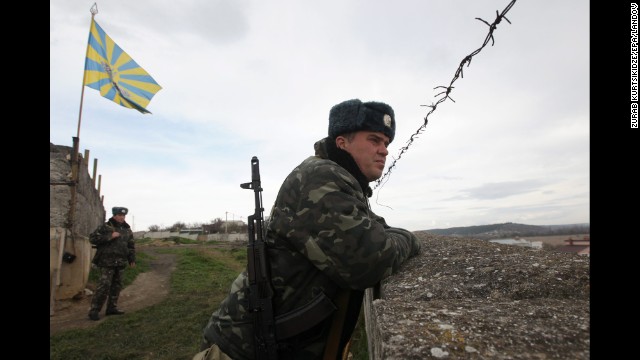 Ukrainian troops guard the Belbek air base on March
6.
Ukrainian troops guard the Belbek air base on March
6.
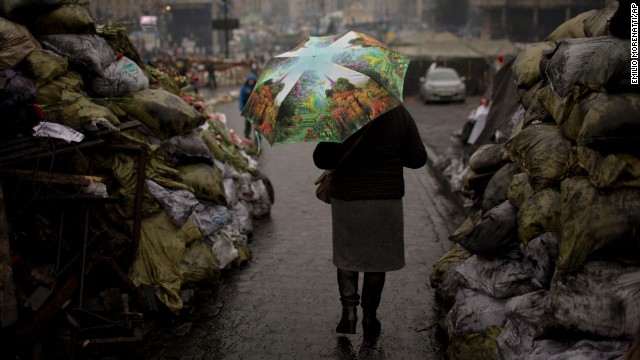 A woman walks past barricades March 6 that were set up by
anti-government protesters in Kiev's Independence Square.
A woman walks past barricades March 6 that were set up by
anti-government protesters in Kiev's Independence Square.
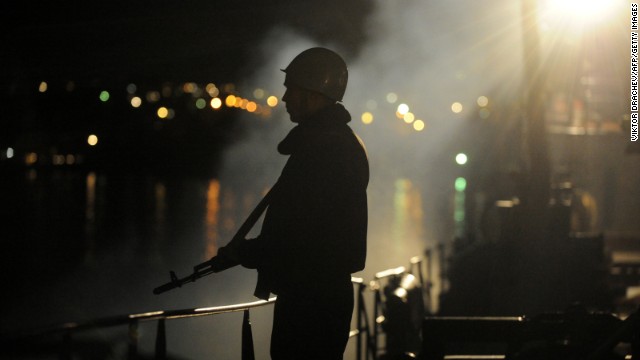 A sailor guards the Ukrainian Navy ship Slavutych in the
Bay of Sevastopol on Wednesday, March 5.
A sailor guards the Ukrainian Navy ship Slavutych in the
Bay of Sevastopol on Wednesday, March 5.
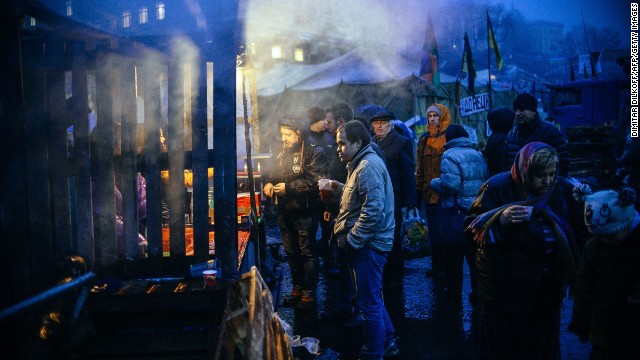 People wait in line for food distribution in Independence
Square on March 5.
People wait in line for food distribution in Independence
Square on March 5.
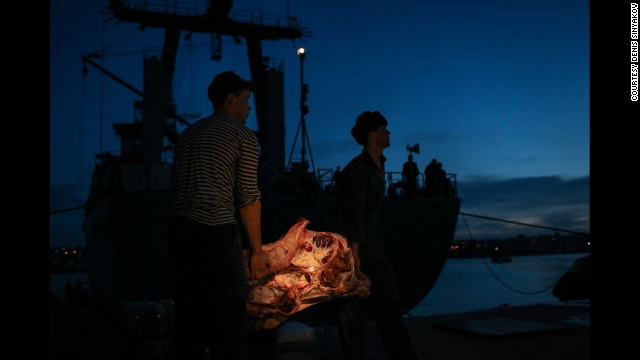 Ukrainian sailors carry meat to their vessel in the
Sevastopol harbor on March 5.
Ukrainian sailors carry meat to their vessel in the
Sevastopol harbor on March 5.
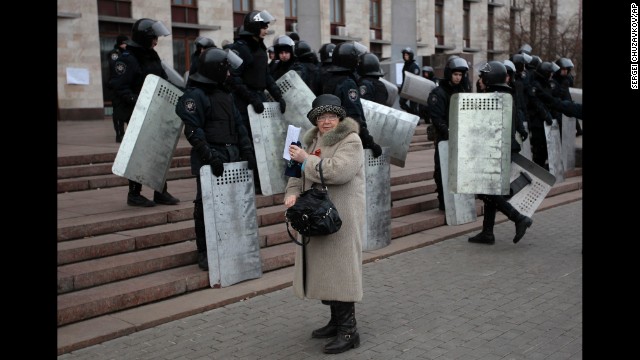 Riot police stand at the entrance of a regional
administrative building during a rally in Donetsk on March 5.
Riot police stand at the entrance of a regional
administrative building during a rally in Donetsk on March 5.
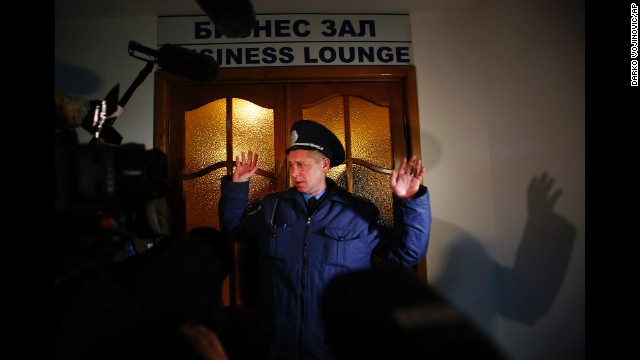 A Ukrainian police officer gives instructions to members
of the media in front of the business class lounge of the Simferopol airport on
March 5.
A Ukrainian police officer gives instructions to members
of the media in front of the business class lounge of the Simferopol airport on
March 5.
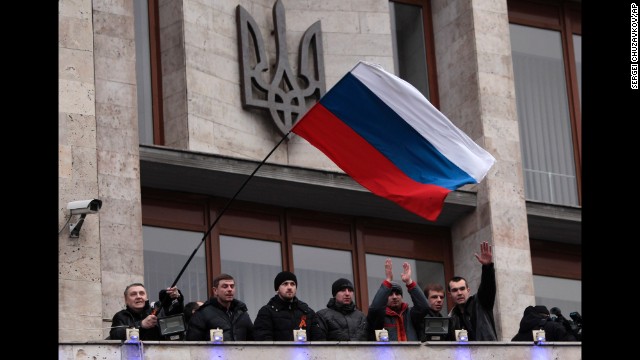 Pro-Russia demonstrators wave a Russian flag after
storming a regional administrative building in Donetsk on March 5.
Pro-Russia demonstrators wave a Russian flag after
storming a regional administrative building in Donetsk on March 5.
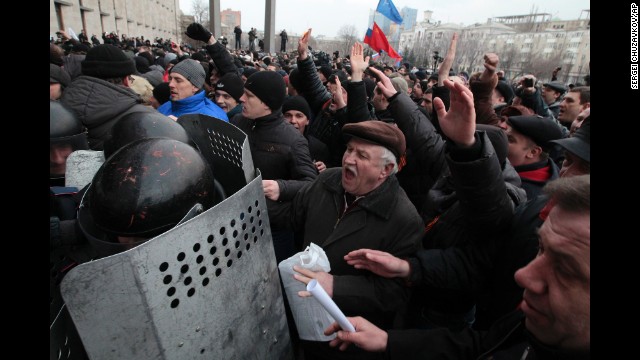 Demonstrators break a police barrier as they storm a
regional administrative building in Donetsk on March 5.
Demonstrators break a police barrier as they storm a
regional administrative building in Donetsk on March 5.
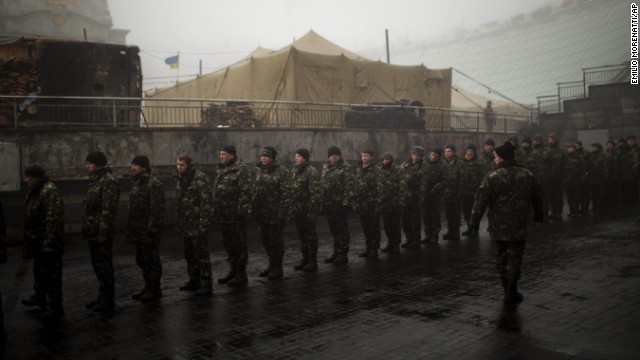 Ukrainian military recruits line up to receive
instructions in Kiev's Independence Square on Tuesday, March 4.
Ukrainian military recruits line up to receive
instructions in Kiev's Independence Square on Tuesday, March 4.
 People stand on the Ukrainian Navy ship Slavutych while
it's at harbor in Sevastopol on March 4. Mattresses were placed over the side of
the ship to hinder any attempted assault.
People stand on the Ukrainian Navy ship Slavutych while
it's at harbor in Sevastopol on March 4. Mattresses were placed over the side of
the ship to hinder any attempted assault.
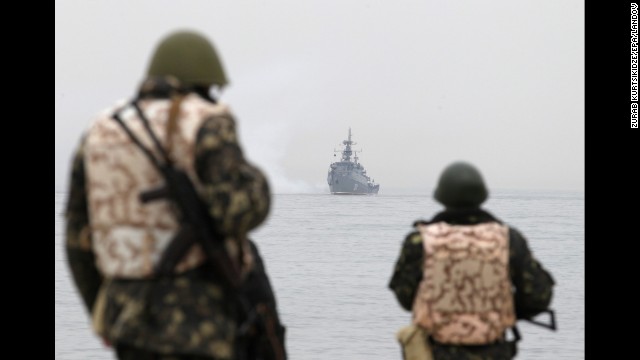 Ukrainian troops watch as a Russian navy ship blocks the
entrance of the Ukrainian navy base in Sevastopol on March 4.
Ukrainian troops watch as a Russian navy ship blocks the
entrance of the Ukrainian navy base in Sevastopol on March 4.
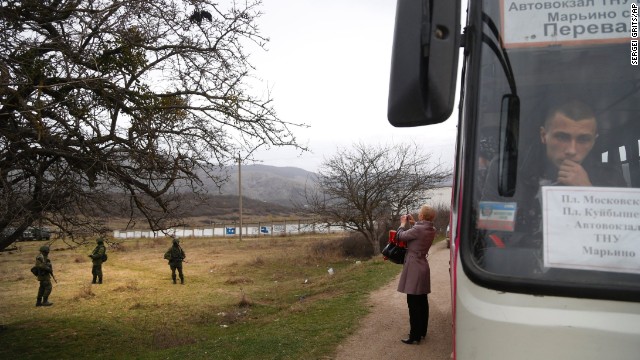 A woman photographs pro-Russian soldiers guarding
Ukraine's infantry base in Perevalne on March 4.
A woman photographs pro-Russian soldiers guarding
Ukraine's infantry base in Perevalne on March 4.
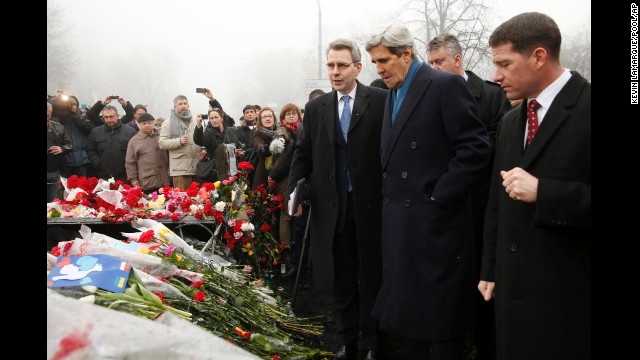 U.S. Secretary of State John Kerry, wearing a blue scarf,
visits a shrine March 4 for the people who were killed in February during
anti-government protests in Kiev.
U.S. Secretary of State John Kerry, wearing a blue scarf,
visits a shrine March 4 for the people who were killed in February during
anti-government protests in Kiev.
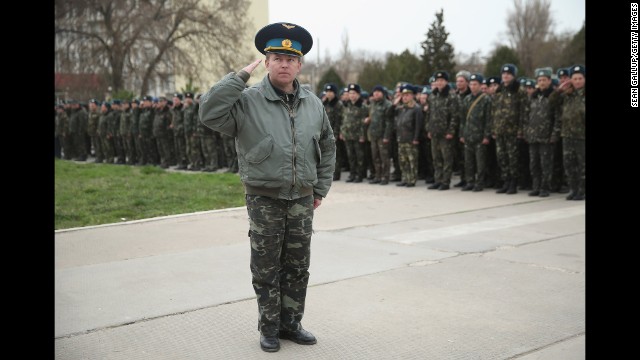 Yuli Mamchun, the commander of the Ukrainian military
garrison at the Belbek air base near Sevastopol, salutes on March 4.
Yuli Mamchun, the commander of the Ukrainian military
garrison at the Belbek air base near Sevastopol, salutes on March 4.
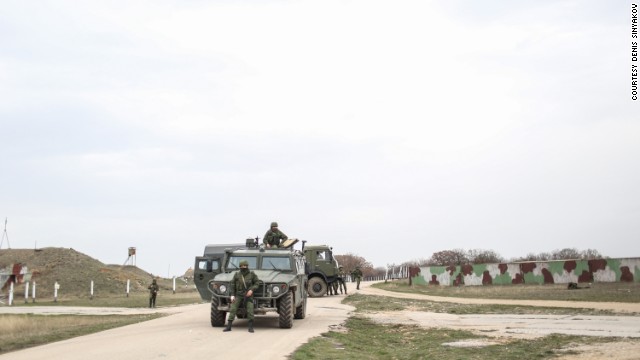 Russian soldiers stand guard at the Belbek air base on
March 4.
Russian soldiers stand guard at the Belbek air base on
March 4.
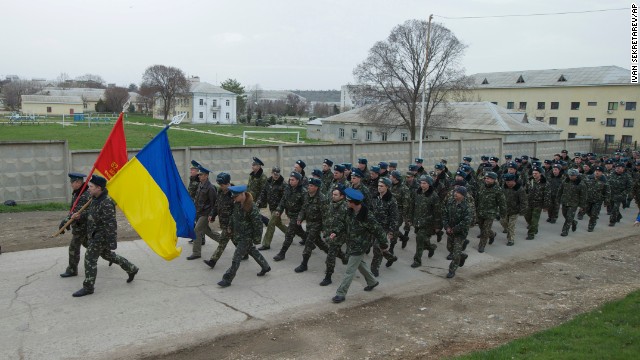 Ukrainian military members march at the Belbek air base
on March 4.
Ukrainian military members march at the Belbek air base
on March 4.
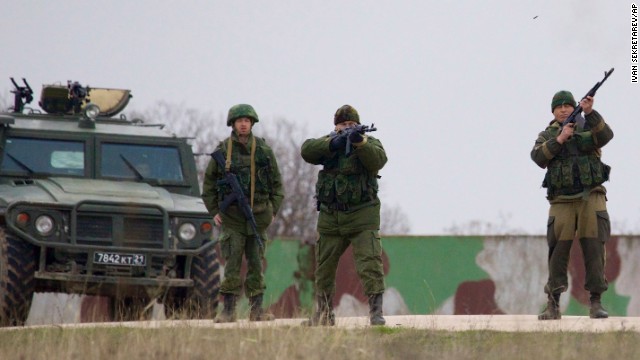 Russian soldiers fire warning shots to keep back
Ukrainian military members at the Belbek air base on March 4.
Russian soldiers fire warning shots to keep back
Ukrainian military members at the Belbek air base on March 4.
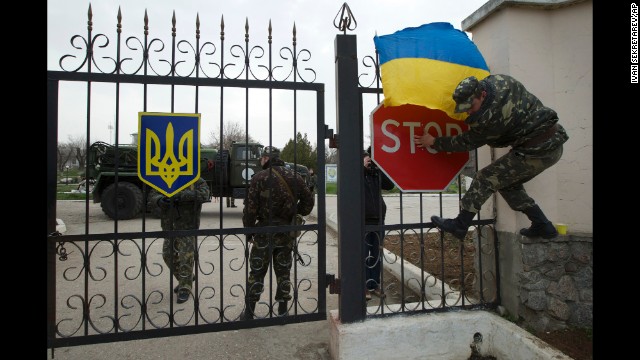 A Ukrainian airman puts the Ukrainian national flag over
the gate of the Belbek air base as they guard what's left under their control on
March 4.
A Ukrainian airman puts the Ukrainian national flag over
the gate of the Belbek air base as they guard what's left under their control on
March 4.
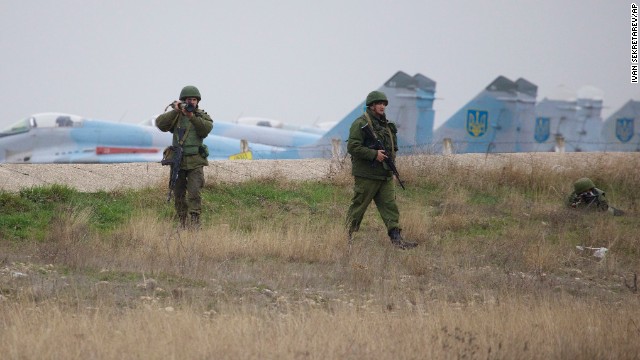 Russian soldiers aim a grenade launcher and machine gun
as they guard positions at the Belbek air base on March 4.
Russian soldiers aim a grenade launcher and machine gun
as they guard positions at the Belbek air base on March 4.
 Ukrainian seamen stand guard on the Ukrainian navy ship
Slavutych in the Sevastopol harbor on Monday, March 3.
Ukrainian seamen stand guard on the Ukrainian navy ship
Slavutych in the Sevastopol harbor on Monday, March 3.
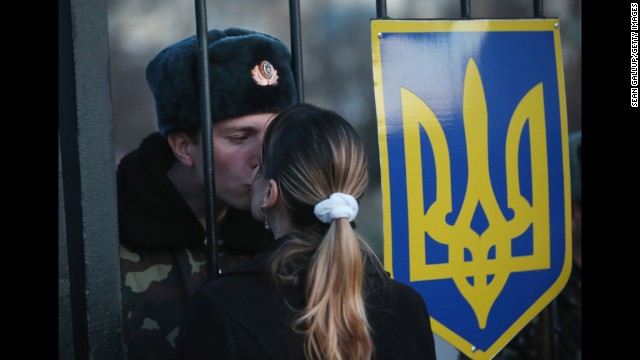 Oleg, a Ukrainian soldier, kisses his girlfriend,
Svetlana, through the gates of the Belbek base entrance on March 3. Tensions are
high at the base, where Ukrainian soldiers were standing guard inside the
building while alleged Russian gunmen were standing guard outside the
gates.
Oleg, a Ukrainian soldier, kisses his girlfriend,
Svetlana, through the gates of the Belbek base entrance on March 3. Tensions are
high at the base, where Ukrainian soldiers were standing guard inside the
building while alleged Russian gunmen were standing guard outside the
gates.
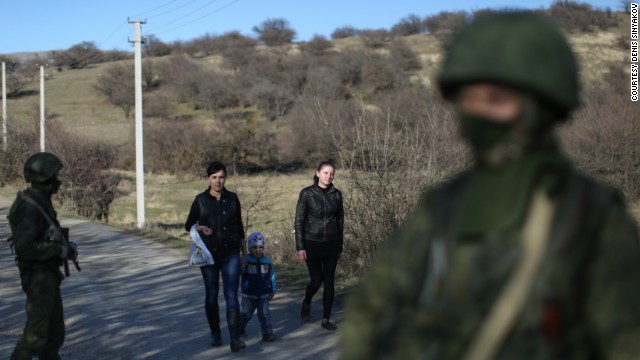 Wives of Ukrainian soldiers walk past Russian soldiers to
visit their husbands guarding a military base in Perevalne on March 3.
Wives of Ukrainian soldiers walk past Russian soldiers to
visit their husbands guarding a military base in Perevalne on March 3.
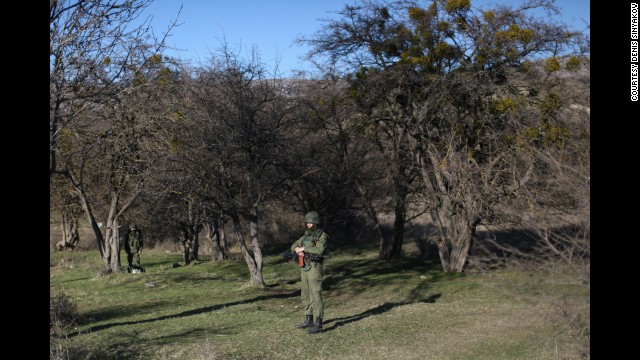 A Russian soldier guards an area outside Ukraine's
military base in the village of Perevalne on March 3.
A Russian soldier guards an area outside Ukraine's
military base in the village of Perevalne on March 3.
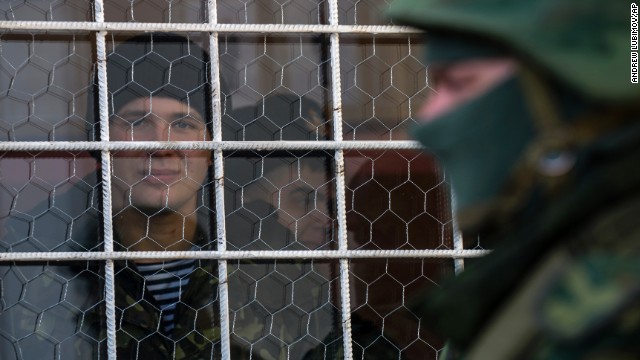 A sailor looks out a window near the entrance to the
Ukrainian navy headquarters in Sevastopol on March 3.
A sailor looks out a window near the entrance to the
Ukrainian navy headquarters in Sevastopol on March 3.
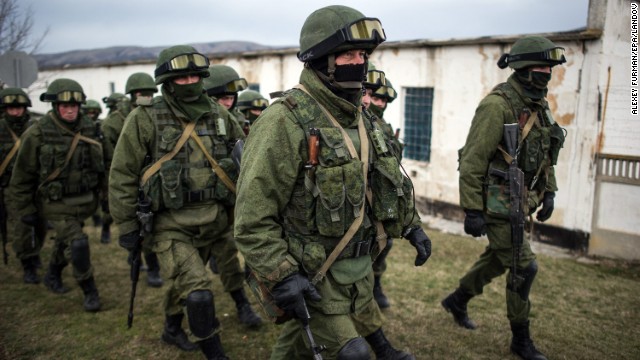 Armed men in military uniform walk outside a Ukrainian
military unit near Simferopol on Sunday, March 2. Hundreds of armed men in
trucks and armored vehicles surrounded the Ukrainian base Sunday in Crimea,
blocking its soldiers from leaving.
Armed men in military uniform walk outside a Ukrainian
military unit near Simferopol on Sunday, March 2. Hundreds of armed men in
trucks and armored vehicles surrounded the Ukrainian base Sunday in Crimea,
blocking its soldiers from leaving.
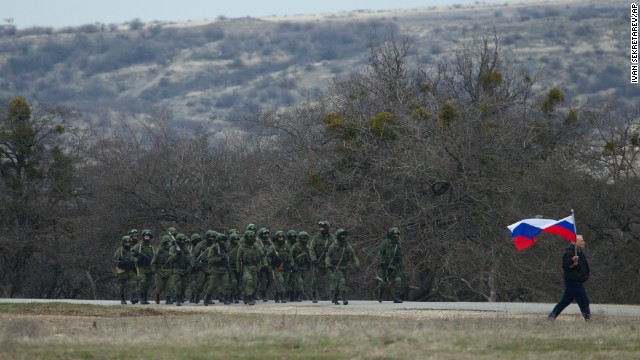 Soldiers walk outside a Ukrainian military base in
Perevalne as a local resident waves a Russian flag March 2.
Soldiers walk outside a Ukrainian military base in
Perevalne as a local resident waves a Russian flag March 2.
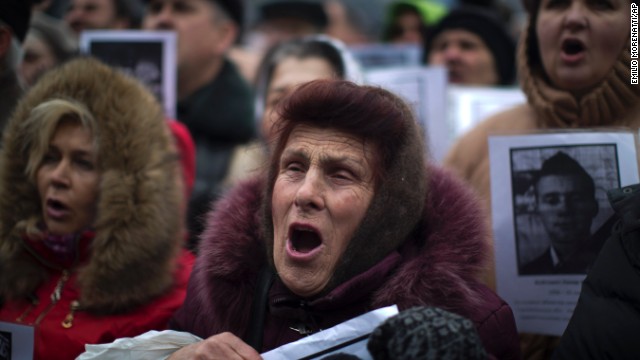 Demonstrators shout during a rally in Kiev's Independence
Square on March 2.
Demonstrators shout during a rally in Kiev's Independence
Square on March 2.
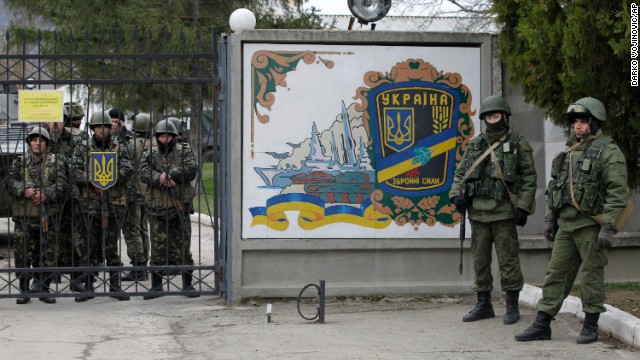 Ukrainian soldiers, left, and unidentified gunmen, right,
stand at the gate of an infantry base in Perevalne on March 2.
Ukrainian soldiers, left, and unidentified gunmen, right,
stand at the gate of an infantry base in Perevalne on March 2.
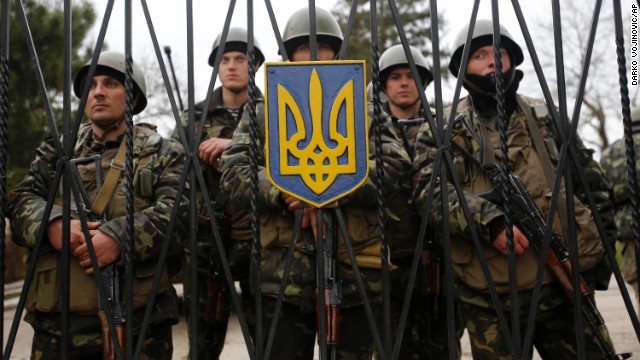 Ukrainian soldiers guard a gate of an infantry base in
Perevalne on March 2.
Ukrainian soldiers guard a gate of an infantry base in
Perevalne on March 2.
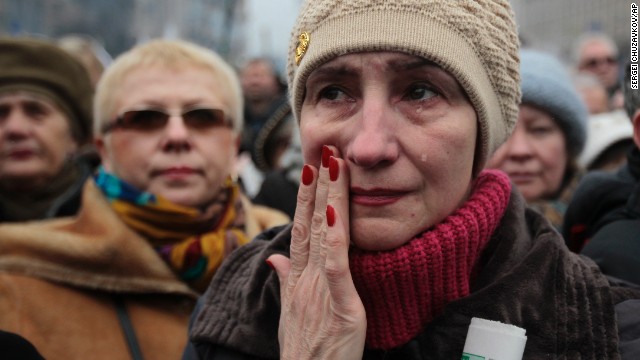 A woman cries during a rally in Independence Square on
March 2.
A woman cries during a rally in Independence Square on
March 2.
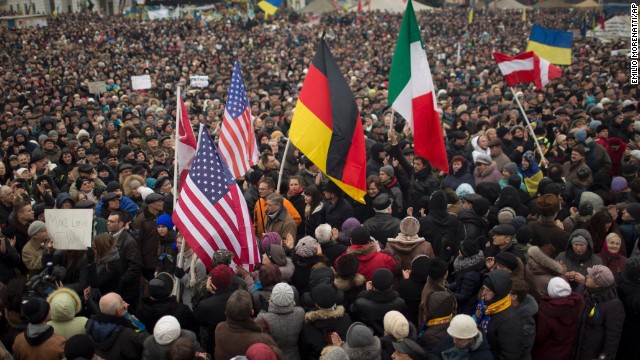 Protesters hold flags of the United States, Germany and
Italy during a rally in Independence Square on March 2.
Protesters hold flags of the United States, Germany and
Italy during a rally in Independence Square on March 2.
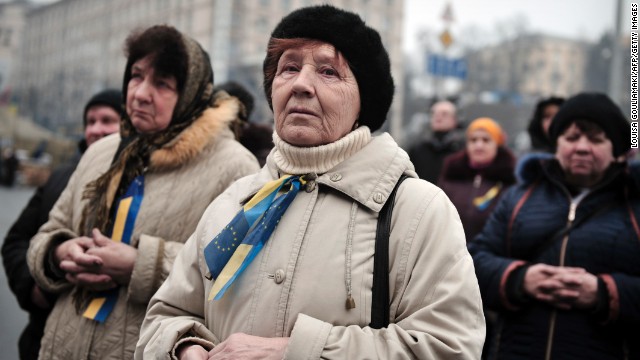 People attend a morning prayer service at Independence
Square on March 2.
People attend a morning prayer service at Independence
Square on March 2.
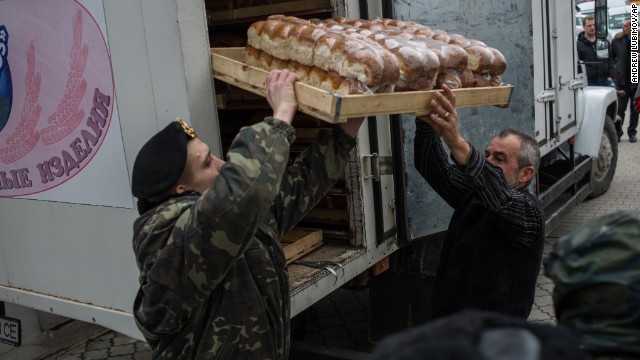 A soldier and a truck driver unload bread outside the
Ukranian navy headquarters in Sevastopol on March 2.
A soldier and a truck driver unload bread outside the
Ukranian navy headquarters in Sevastopol on March 2.
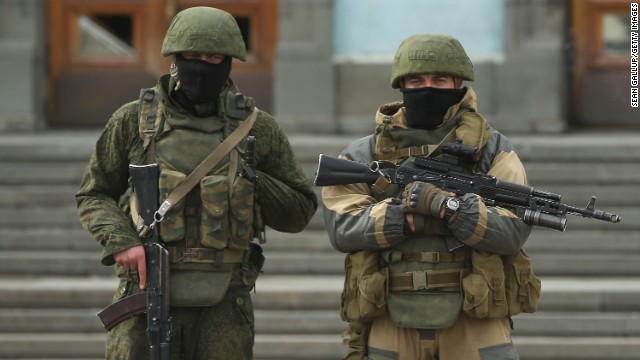 Heavily armed troops, displaying no identifying insignia
and who were mingling with local pro-Russian militants, stand guard outside a
local government building in Simferopol on March 2.
Heavily armed troops, displaying no identifying insignia
and who were mingling with local pro-Russian militants, stand guard outside a
local government building in Simferopol on March 2.
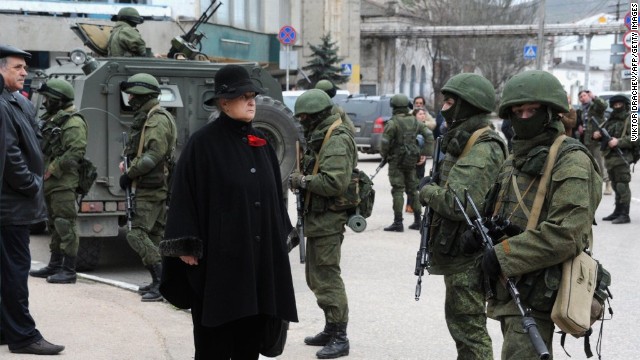 A woman waits in front of unidentified men in military
fatigues who were blocking a base of the Ukrainian frontier guard unit in
Balaklava, Ukraine, on Saturday, March 1.
A woman waits in front of unidentified men in military
fatigues who were blocking a base of the Ukrainian frontier guard unit in
Balaklava, Ukraine, on Saturday, March 1.
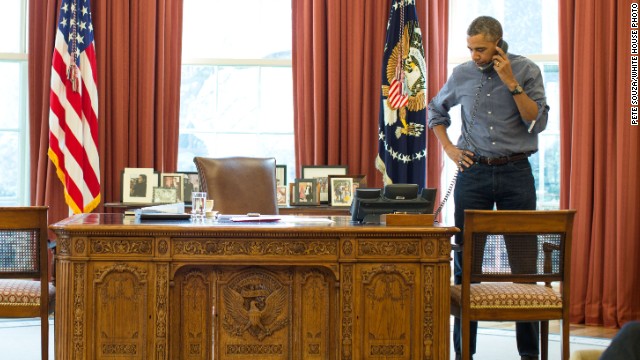 U.S. President Barack Obama, in the Oval Office of the
White House, talks on the phone March 1 with Russian President Vladimir
Putin.
U.S. President Barack Obama, in the Oval Office of the
White House, talks on the phone March 1 with Russian President Vladimir
Putin.
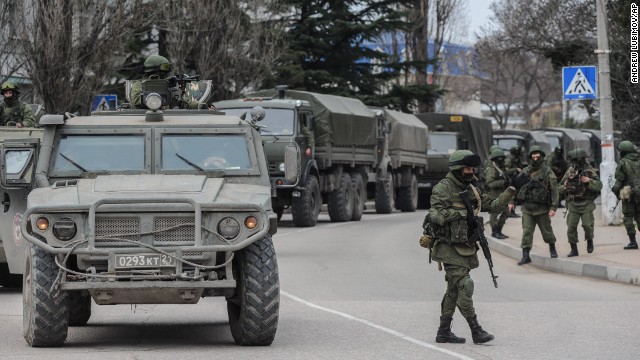 Troops stand guard in Balaklava on March 1.
Troops stand guard in Balaklava on March 1.
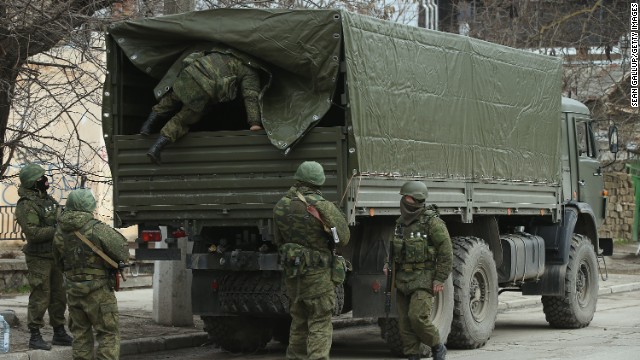 Heavily armed soldiers displaying no identifying insignia
maintain watch in Simferopol on March 1.
Heavily armed soldiers displaying no identifying insignia
maintain watch in Simferopol on March 1.
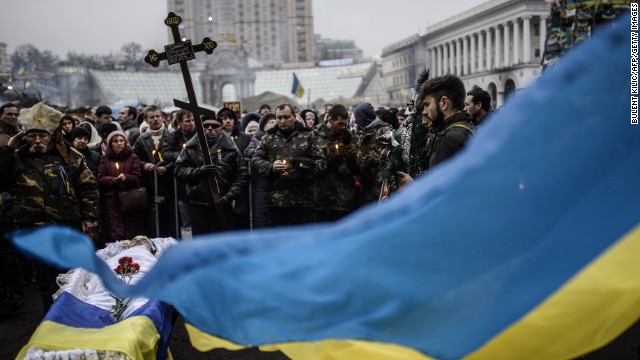 People gather around the coffin of a man who was killed
during clashes with riot police in Independence Square.
People gather around the coffin of a man who was killed
during clashes with riot police in Independence Square.
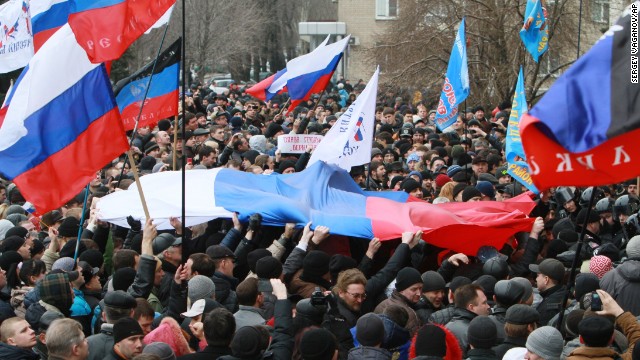 Pro-Russian activists hold Russian flags during a rally
in the center of Donetsk on March 1.
Pro-Russian activists hold Russian flags during a rally
in the center of Donetsk on March 1.
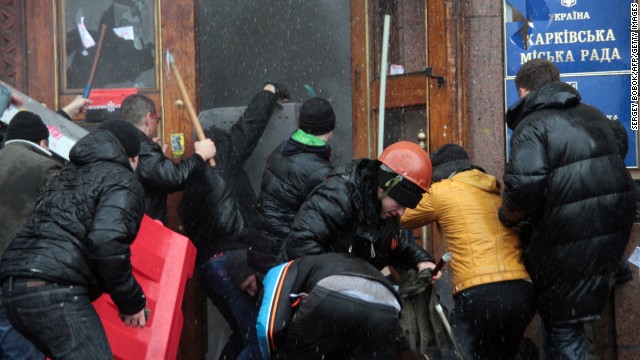 Pro-Russian activists clash with Maidan supporters as
they storm the regional government building in Kharkiv, Ukraine, on March
1.
Pro-Russian activists clash with Maidan supporters as
they storm the regional government building in Kharkiv, Ukraine, on March
1.
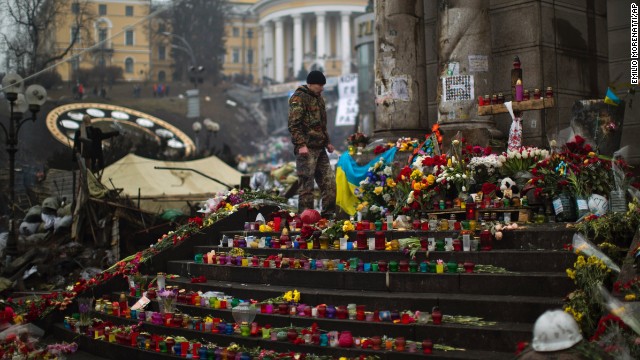 A protester stands at a memorial March 1 for the people
killed in clashes at Independence Square.
A protester stands at a memorial March 1 for the people
killed in clashes at Independence Square.
 Armed men patrol outside the Simferopol International
Airport on Friday, February 28.
Armed men patrol outside the Simferopol International
Airport on Friday, February 28.
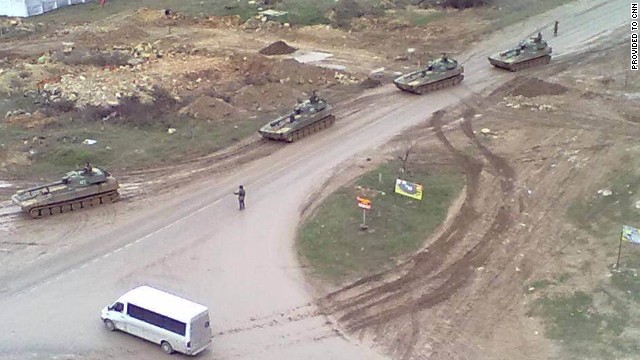 An image provided to CNN by a local resident shows
Russian tanks on the move in Sevastopol.
An image provided to CNN by a local resident shows
Russian tanks on the move in Sevastopol.
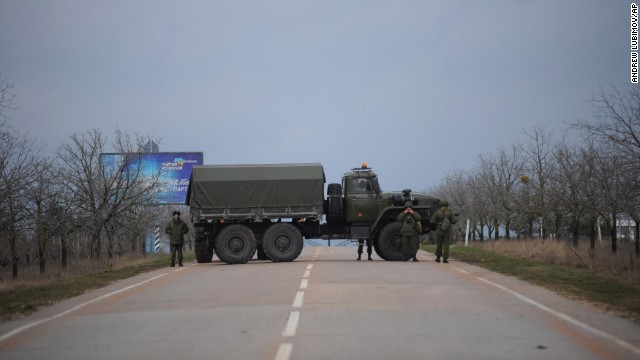 Russian troops block a road February 28 toward the
military airport in Sevastopol. The Russian Black Sea Fleet is based at the port
city.
Russian troops block a road February 28 toward the
military airport in Sevastopol. The Russian Black Sea Fleet is based at the port
city.
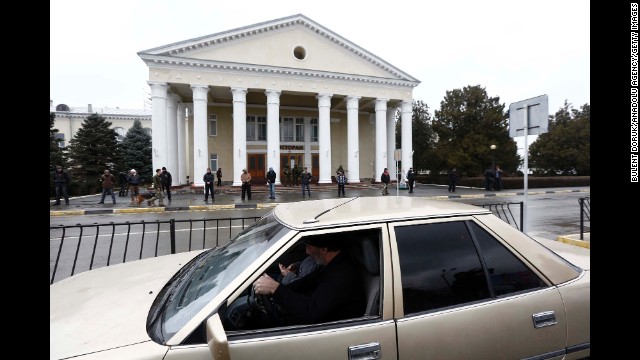 Armed men stand guard in front of a building near the
Simferopol airport on February 28.
Armed men stand guard in front of a building near the
Simferopol airport on February 28.
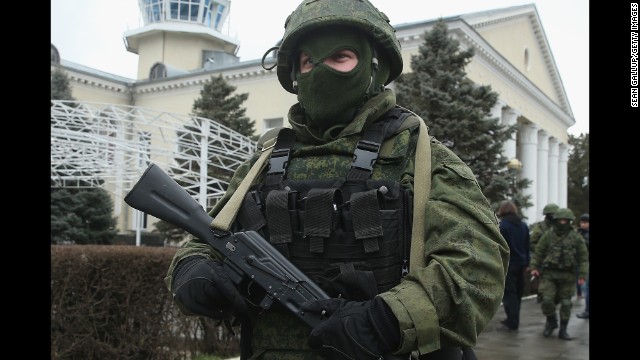 An armed man wearing no identifying insignia patrols
outside Simferopol International Airport on February 28.
An armed man wearing no identifying insignia patrols
outside Simferopol International Airport on February 28.
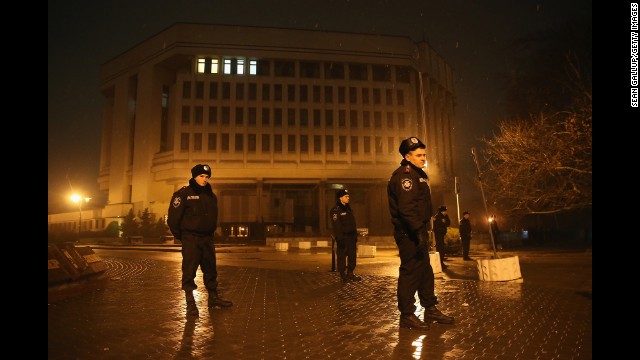 Police stand guard outside the Crimea regional parliament
building Thursday, February 27, in Simferopol. Armed men seized the regional
government administration building and parliament in Crimea.
Police stand guard outside the Crimea regional parliament
building Thursday, February 27, in Simferopol. Armed men seized the regional
government administration building and parliament in Crimea.
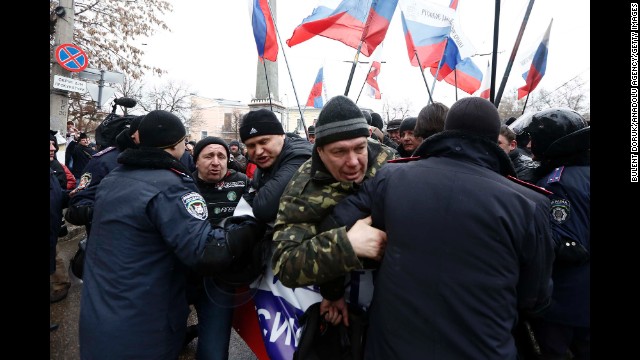 Police intervene as Russian supporters gather in front of
the parliament building in Simferopol on February 27.
Police intervene as Russian supporters gather in front of
the parliament building in Simferopol on February 27.
 A man adds fuel to a fire at a barricade in Independence
Square on February 27. Dozens of people were killed during clashes between
security forces and protesters.
A man adds fuel to a fire at a barricade in Independence
Square on February 27. Dozens of people were killed during clashes between
security forces and protesters.
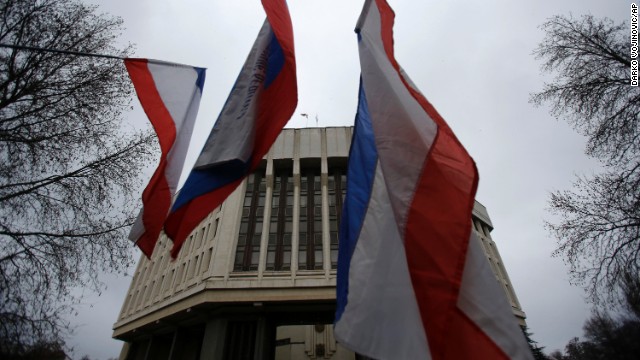 Pro-Russia demonstrators wave Russian and Crimean flags
in front of a local government building in Simferopol on February 27.
Pro-Russia demonstrators wave Russian and Crimean flags
in front of a local government building in Simferopol on February 27.
 Barricades in front of a government building in
Simferopol on February 27 hold a banner that reads: "Crimea Russia." There's a
broad divide between those who support the pro-Western developments in Kiev and
those who back Russia's continued influence in Crimea and across Ukraine.
Barricades in front of a government building in
Simferopol on February 27 hold a banner that reads: "Crimea Russia." There's a
broad divide between those who support the pro-Western developments in Kiev and
those who back Russia's continued influence in Crimea and across Ukraine.
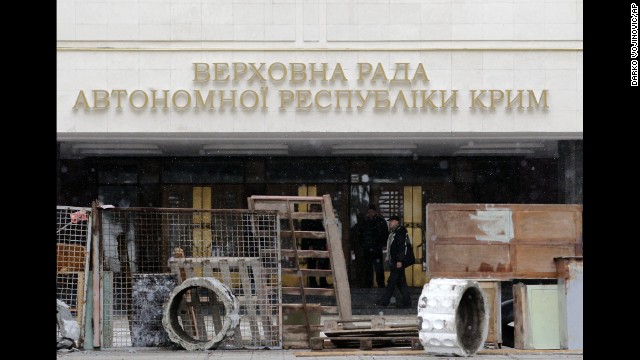 Protesters stand in front of a government building in
Simferopol on February 27. Tensions have simmered in the Crimea region since the
ouster of Ukrainian President Viktor Yanukovych.
Protesters stand in front of a government building in
Simferopol on February 27. Tensions have simmered in the Crimea region since the
ouster of Ukrainian President Viktor Yanukovych.
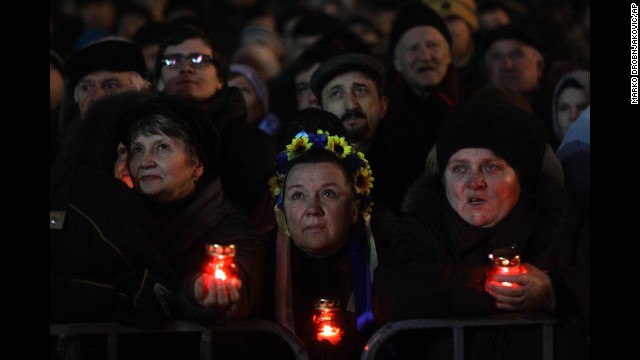 Protesters in support of the president's ouster rally in
Independence Square, which has been the center of opposition, on Wednesday,
February 26.
Protesters in support of the president's ouster rally in
Independence Square, which has been the center of opposition, on Wednesday,
February 26.
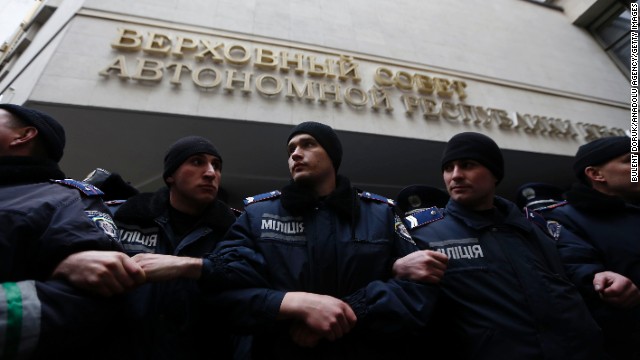 Security forces stand guard during clashes between
opposing sides in front of Crimea's parliament building in Simferopol on
February 26.
Security forces stand guard during clashes between
opposing sides in front of Crimea's parliament building in Simferopol on
February 26.
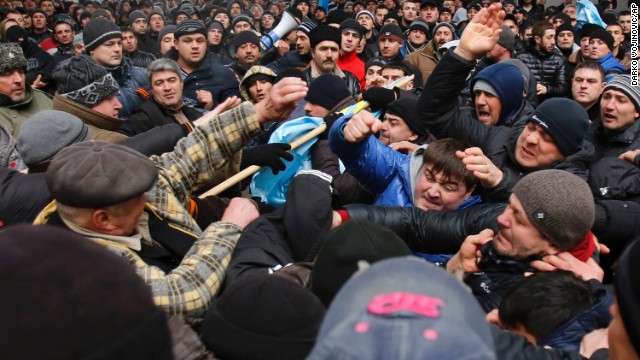 Pro-Russian demonstrators, right, clash with anti-Russian
protesters in front of a government building in Simferopol on February 26.
Pro-Russian demonstrators, right, clash with anti-Russian
protesters in front of a government building in Simferopol on February 26.
 A police officer gets pulled into a crowd of Crimean
Tatars in Simferopol on February 26. The Tatars, an ethnic minority group
deported during the Stalin era, rallied in support of Ukraine's interim
government.
A police officer gets pulled into a crowd of Crimean
Tatars in Simferopol on February 26. The Tatars, an ethnic minority group
deported during the Stalin era, rallied in support of Ukraine's interim
government.
 A man places flowers at a barricade near Independence
Square on February 26.
A man places flowers at a barricade near Independence
Square on February 26.
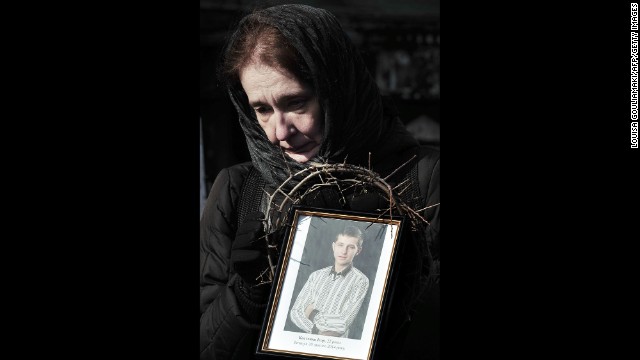 On February 26 in Kiev, a woman holds a photograph of a
protester killed during the height of tensions.
On February 26 in Kiev, a woman holds a photograph of a
protester killed during the height of tensions.
 Police guard a government building in Donetsk on February
26.
Police guard a government building in Donetsk on February
26.
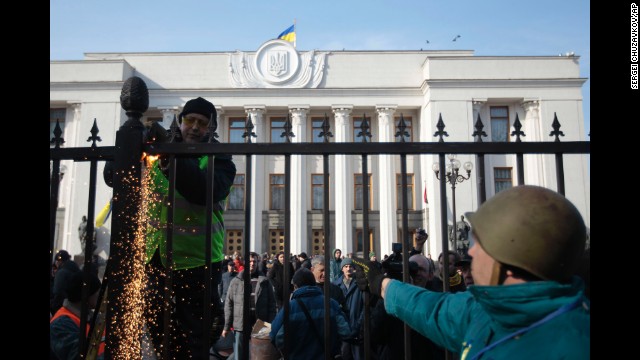 Protesters remove a fence that surrounds Ukraine's
parliament in Kiev on February 26.
Protesters remove a fence that surrounds Ukraine's
parliament in Kiev on February 26.
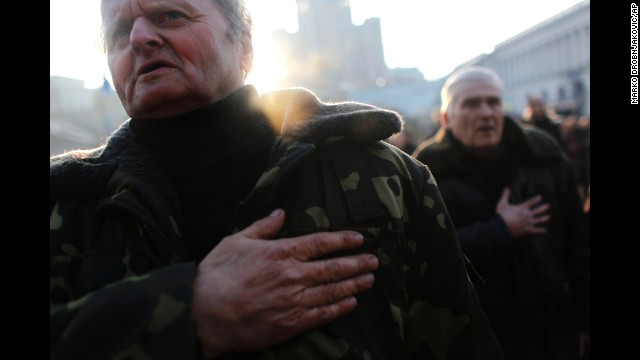 People sing the Ukrainian national anthem at Independence
Square on Monday, February 24.
People sing the Ukrainian national anthem at Independence
Square on Monday, February 24.
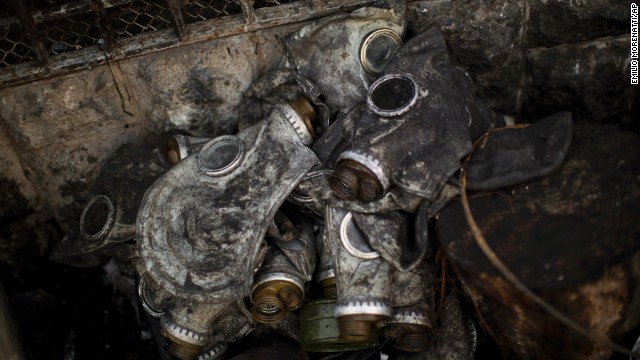 Gas masks used by protesters sit next to a barricade in
Independence Square on February 24.
Gas masks used by protesters sit next to a barricade in
Independence Square on February 24.
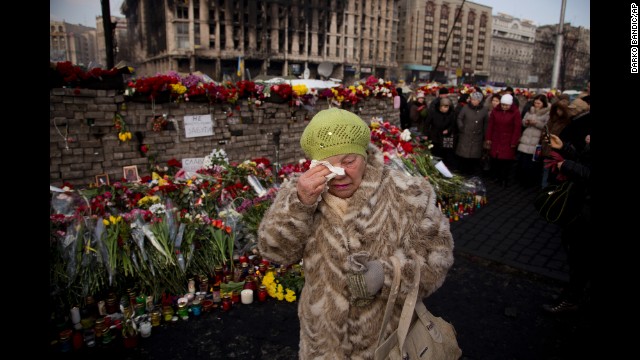 A woman cries February 24 near a memorial for the people
killed in Kiev.
A woman cries February 24 near a memorial for the people
killed in Kiev.
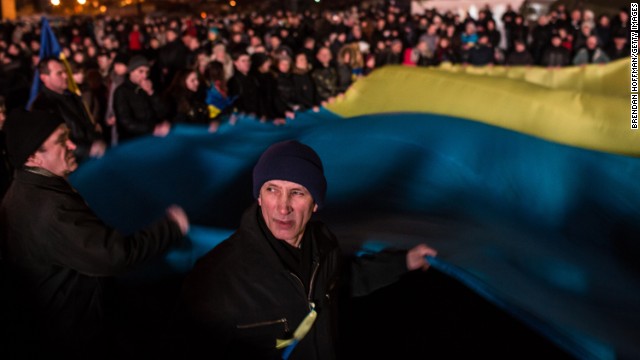 People wave a large Ukrainian flag in Independence Square
on Sunday, February 23.
People wave a large Ukrainian flag in Independence Square
on Sunday, February 23.
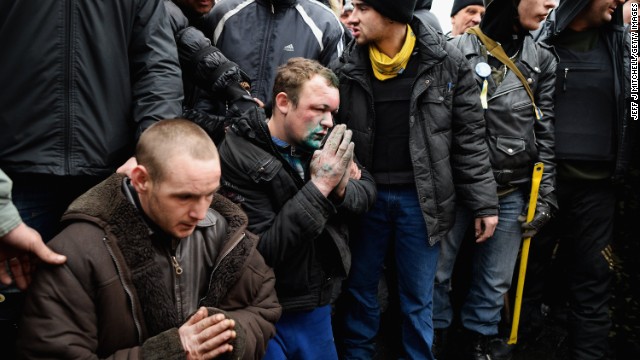 Two pro-government supporters are made to pray February
23 in front of a shrine to dead anti-government protesters.
Two pro-government supporters are made to pray February
23 in front of a shrine to dead anti-government protesters.
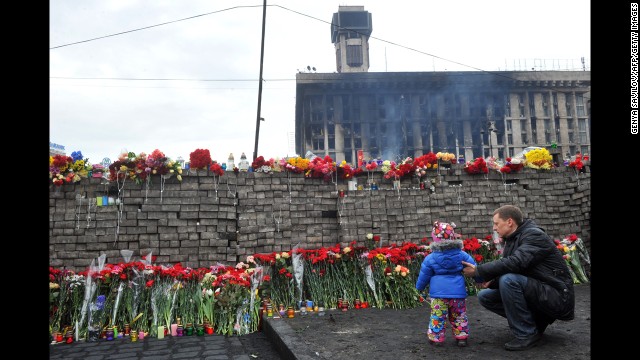 A man and his daughter lay flowers at a memorial for
protesters killed in Independence Square.
A man and his daughter lay flowers at a memorial for
protesters killed in Independence Square.
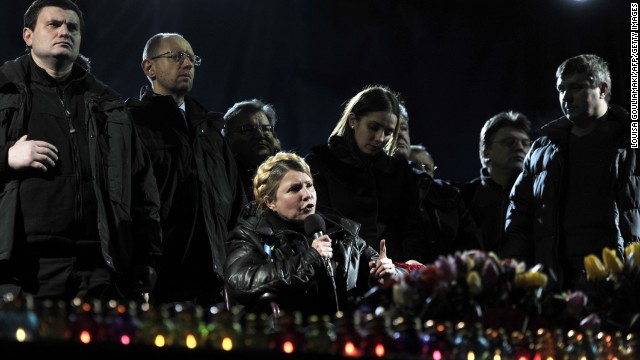 Former Prime Minister Yulia Tymoshenko speaks at
Independence Square on Saturday, February 22, hours after being released from
prison. Tymoshenko, considered a hero of a 2004 revolution against Yanukovych,
was released after 2½ years behind bars.
Former Prime Minister Yulia Tymoshenko speaks at
Independence Square on Saturday, February 22, hours after being released from
prison. Tymoshenko, considered a hero of a 2004 revolution against Yanukovych,
was released after 2½ years behind bars.
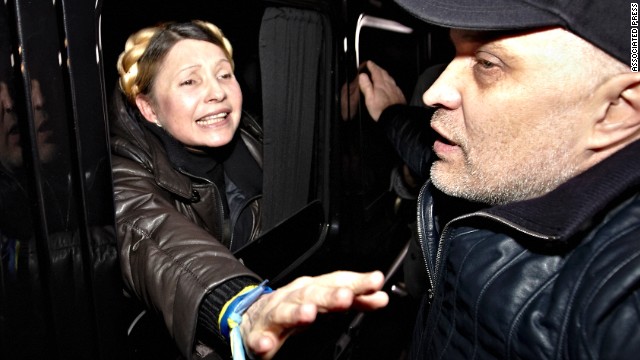 Tymoshenko is greeted by supporters shortly after being
freed from prison in Kharkiv on February 22.
Tymoshenko is greeted by supporters shortly after being
freed from prison in Kharkiv on February 22.
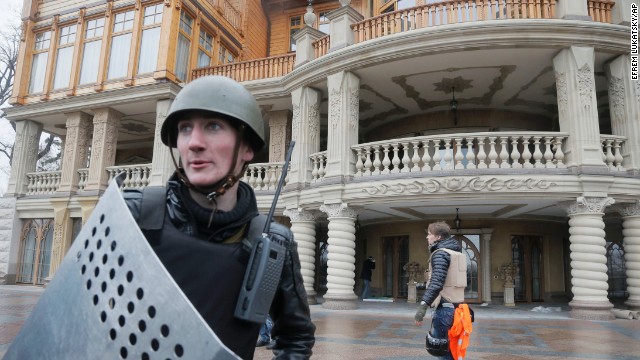 A protester guards the entrance to Yanukovych's abandoned
residence outside Kiev on February 22.
A protester guards the entrance to Yanukovych's abandoned
residence outside Kiev on February 22.
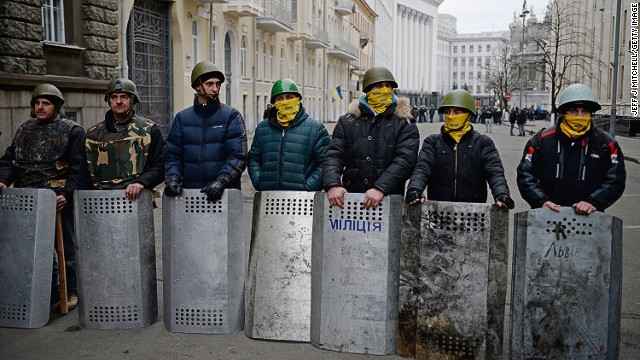 Anti-government protesters guard the streets next to the
presidential offices in Kiev on February 22.
Anti-government protesters guard the streets next to the
presidential offices in Kiev on February 22.
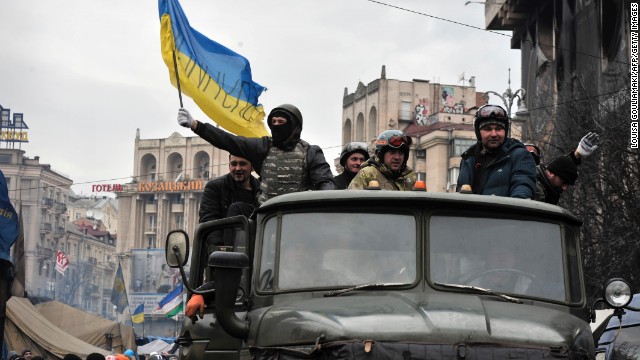 Anti-government protesters drive a military vehicle in
Independence Square on February 22. Many protesters said they wouldn't leave the
square until Yanukovych resigned.
Anti-government protesters drive a military vehicle in
Independence Square on February 22. Many protesters said they wouldn't leave the
square until Yanukovych resigned.
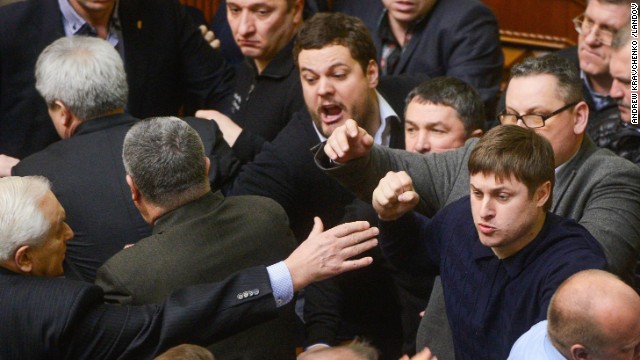 Ukrainian lawmakers argue during a session of Parliament
on Friday, February 21.
Ukrainian lawmakers argue during a session of Parliament
on Friday, February 21.
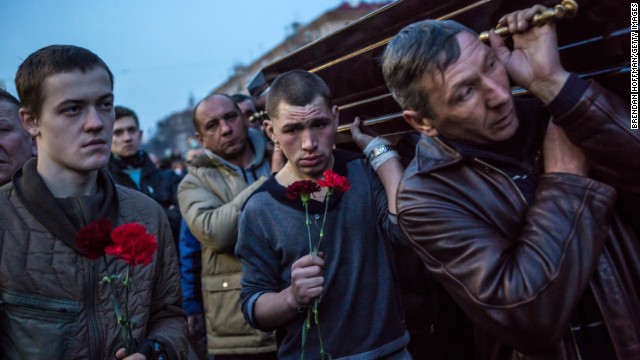 Men in Kiev carry a casket containing the body of a
protester killed in clashes with police.
Men in Kiev carry a casket containing the body of a
protester killed in clashes with police.
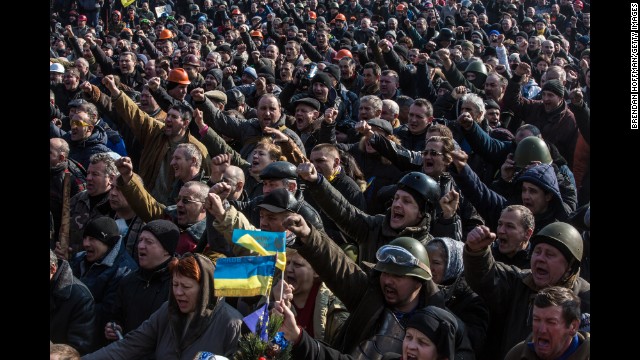 Protesters cheer after news of an agreement between the
opposing sides in Kiev on February 21.
Protesters cheer after news of an agreement between the
opposing sides in Kiev on February 21.






































































































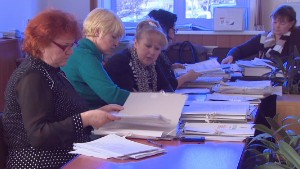
No comments:
Post a Comment